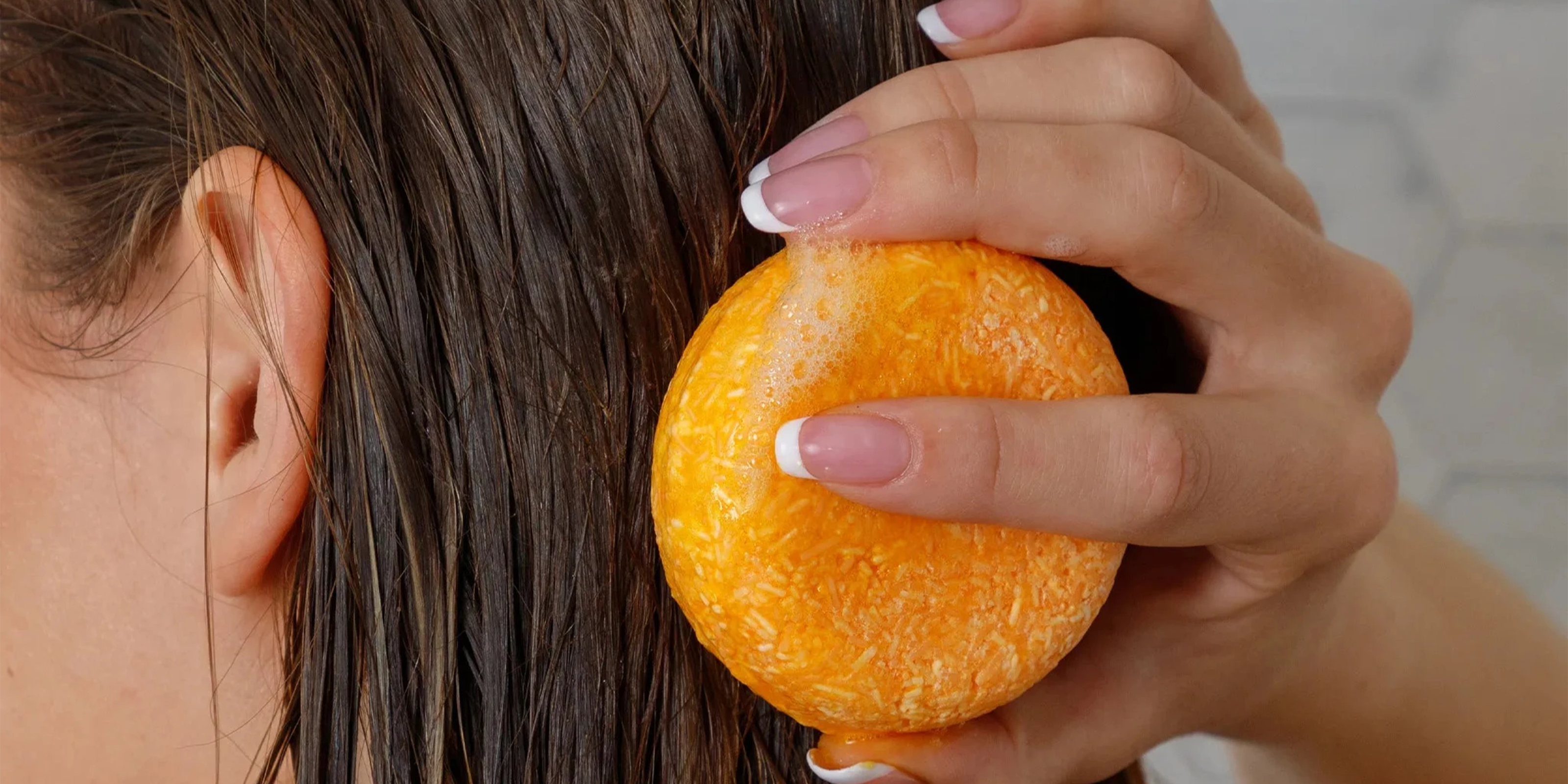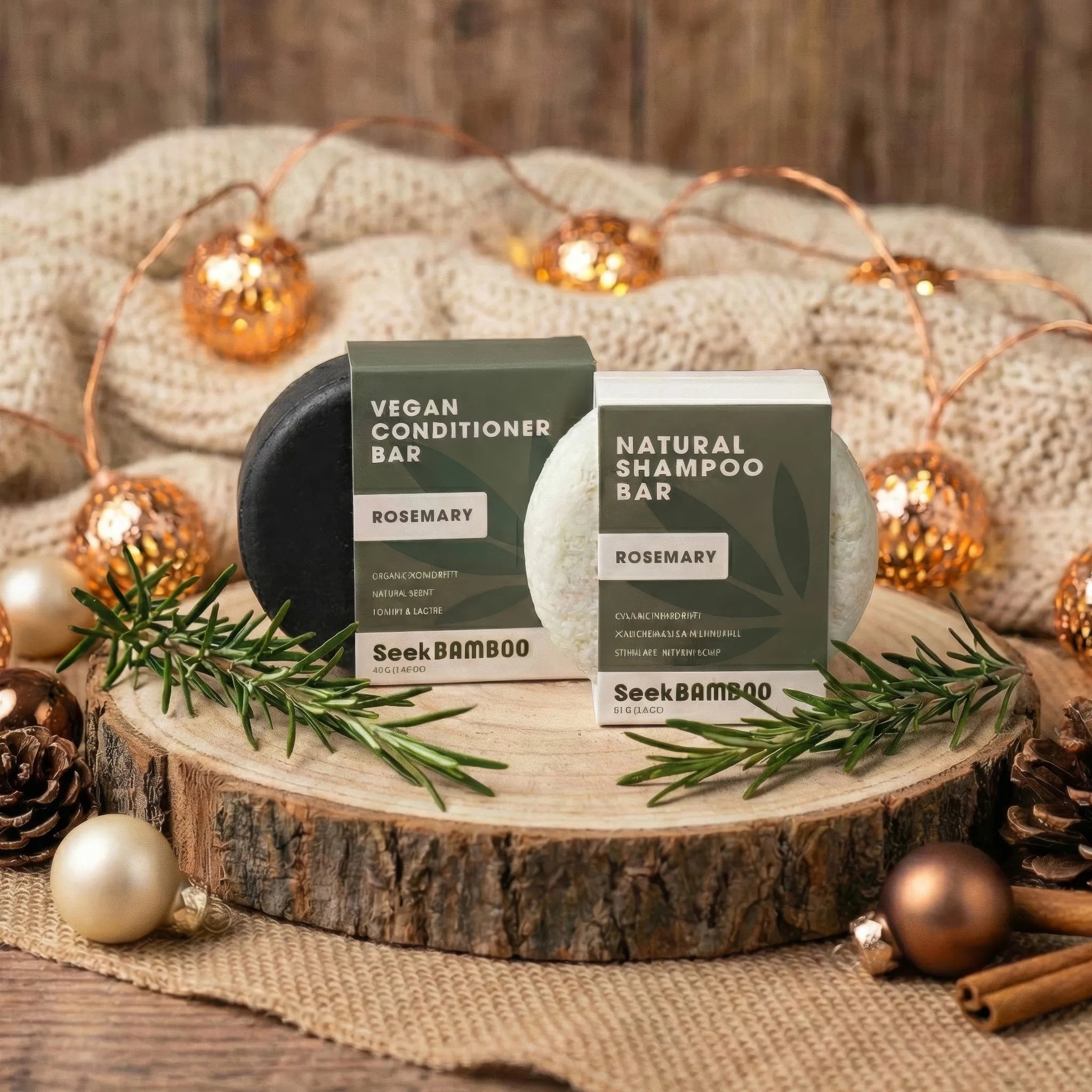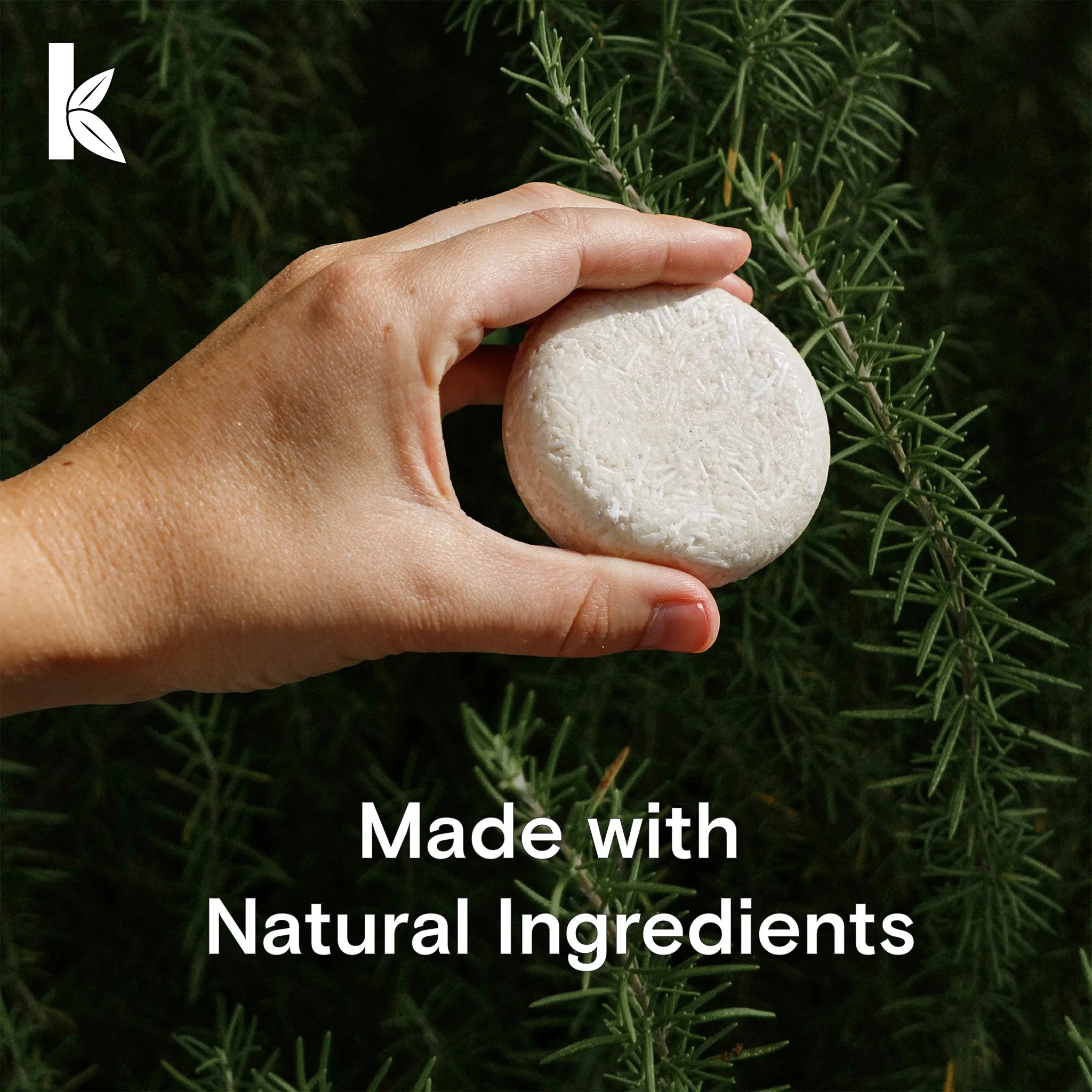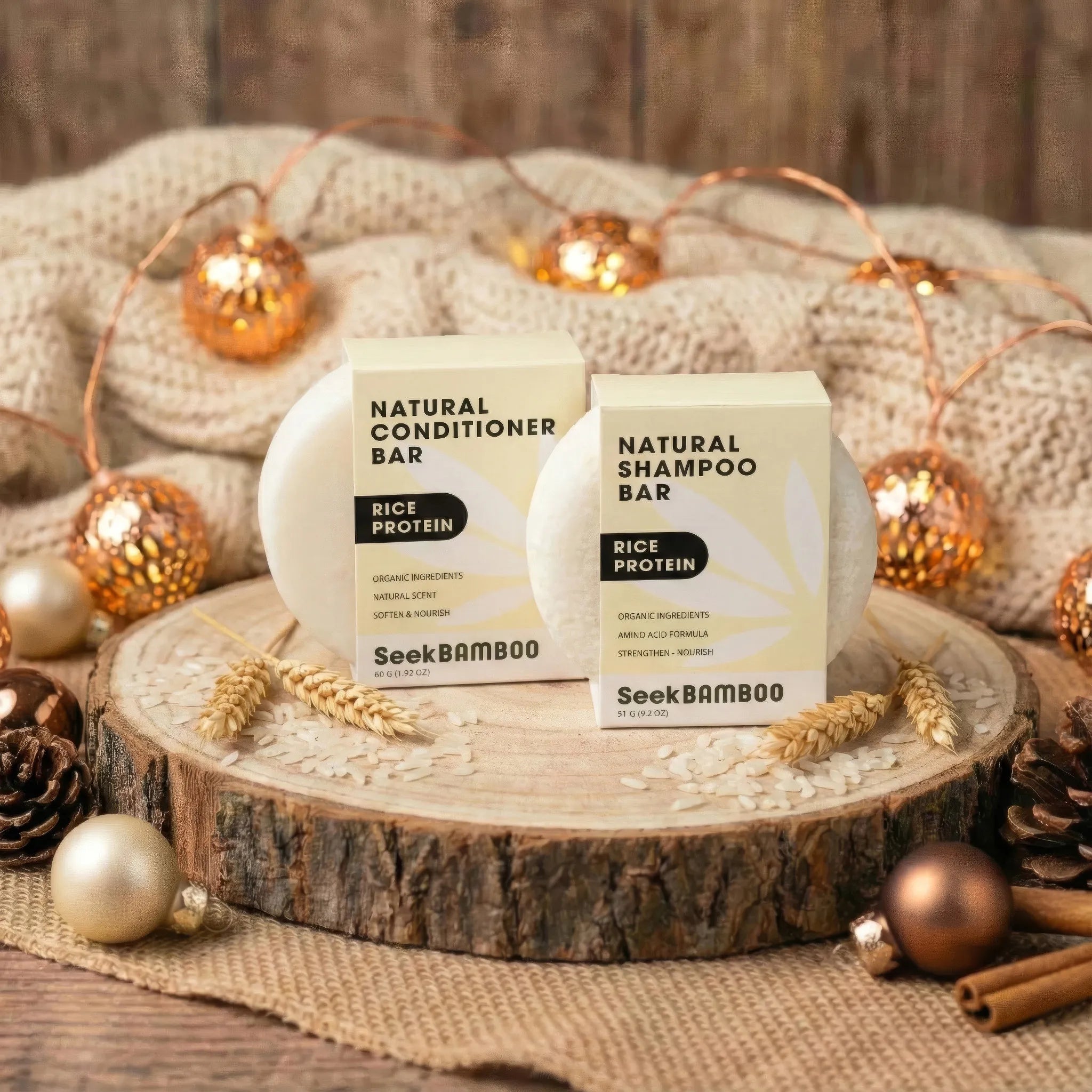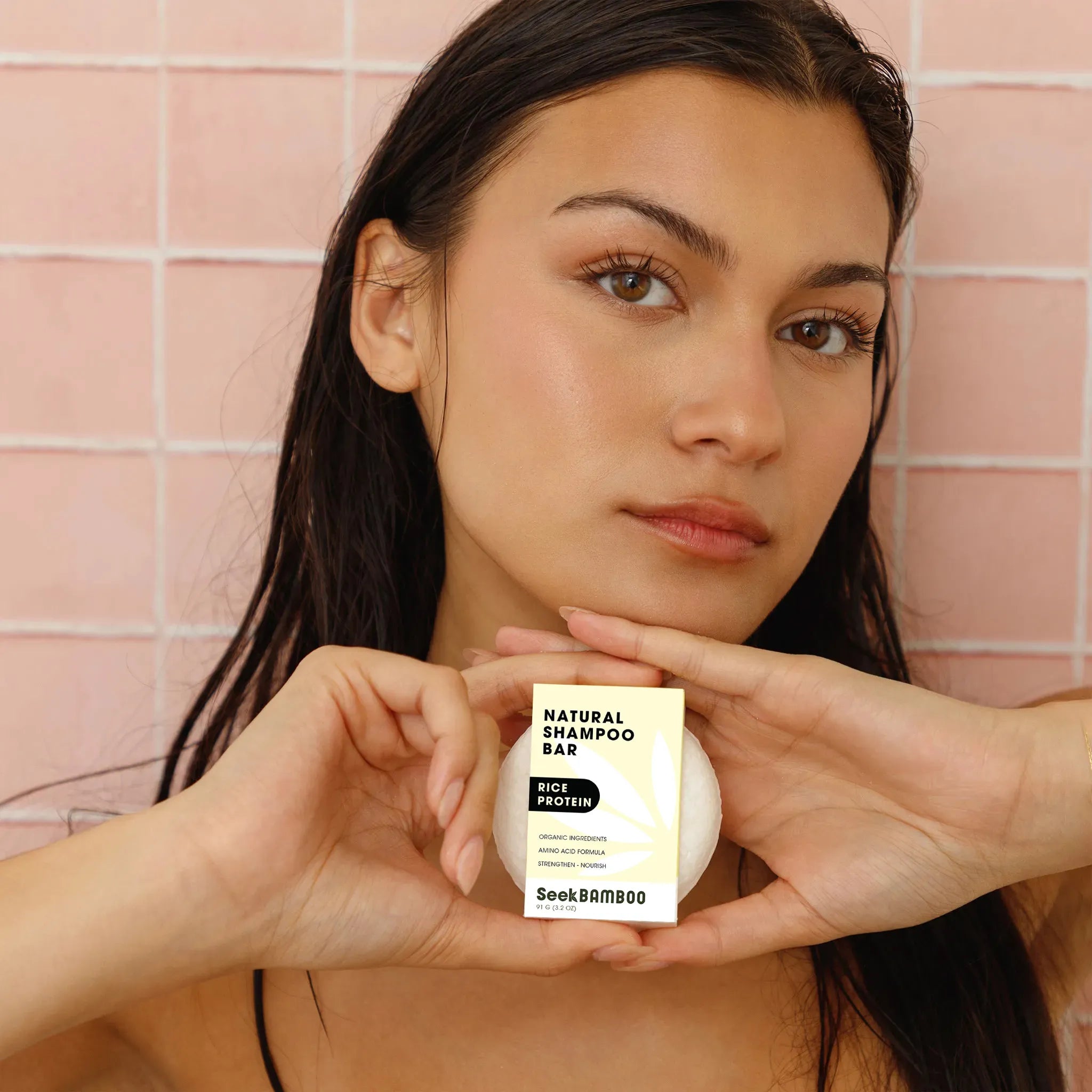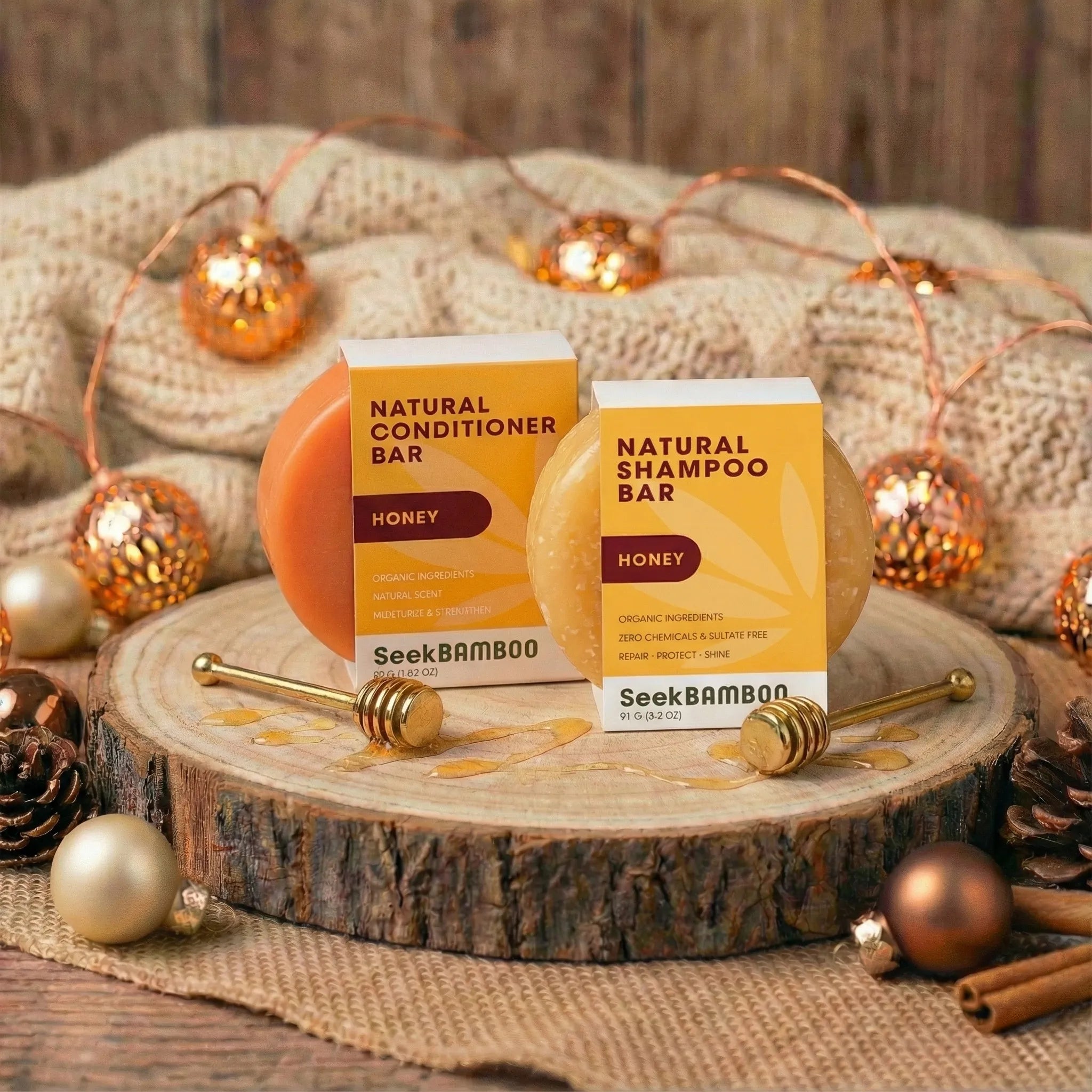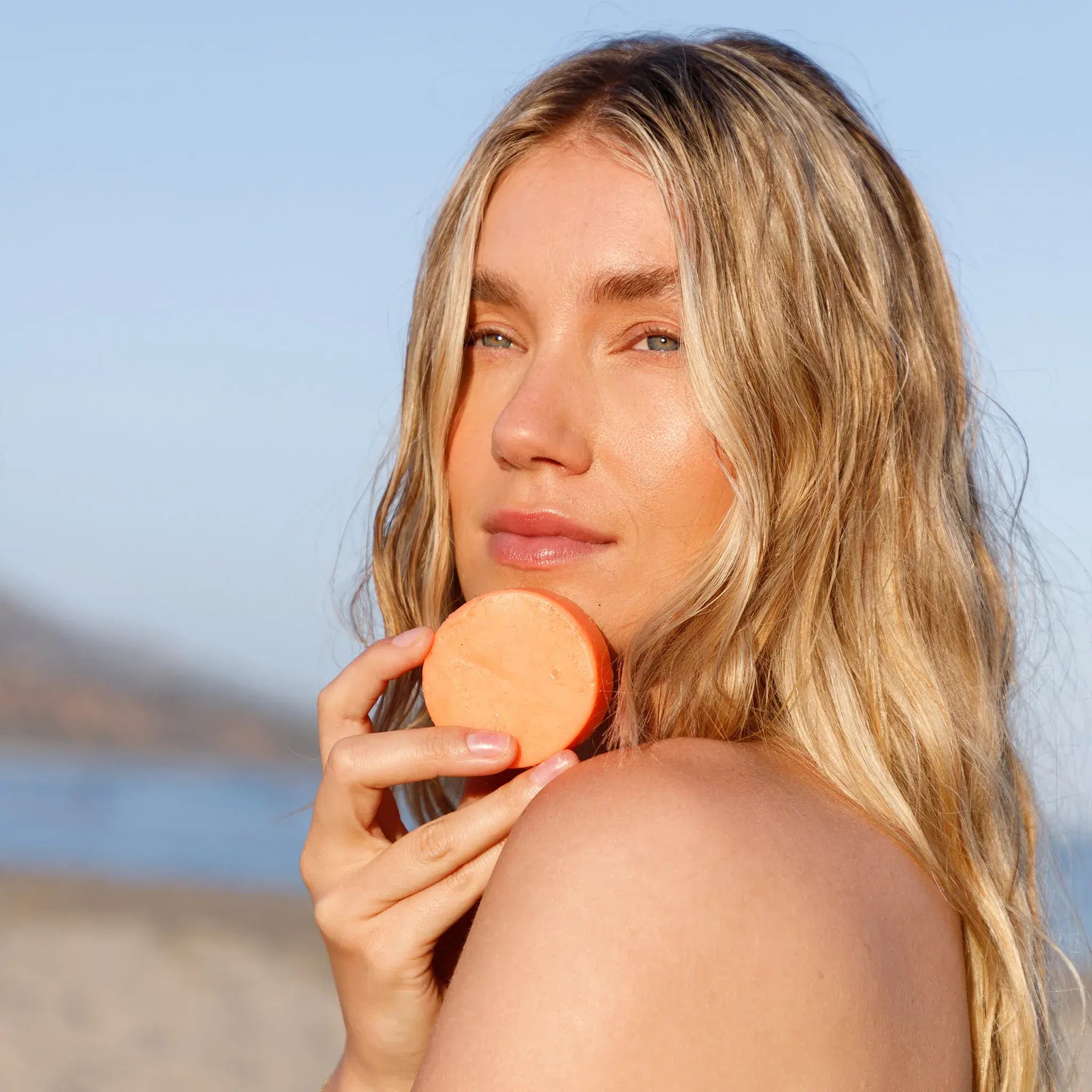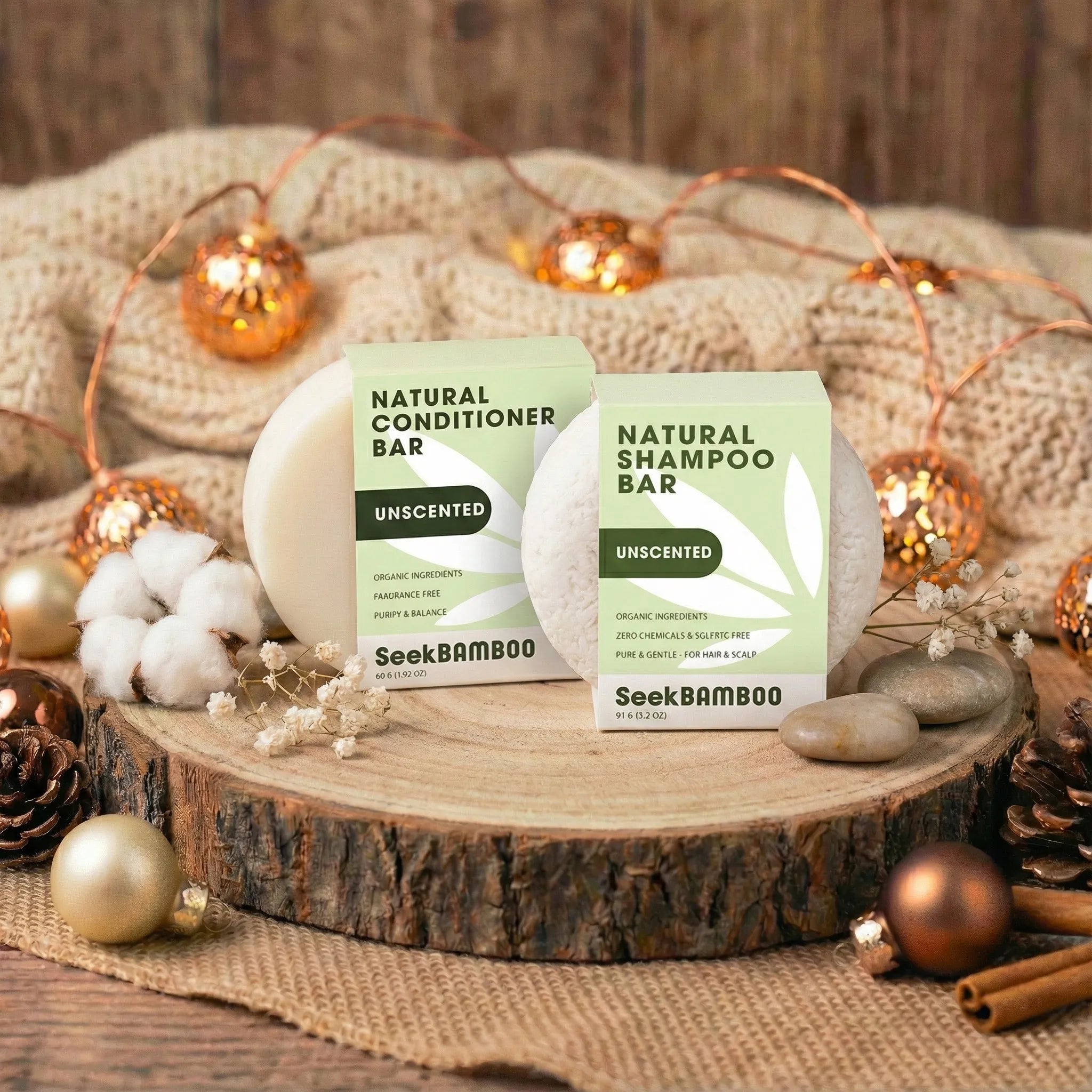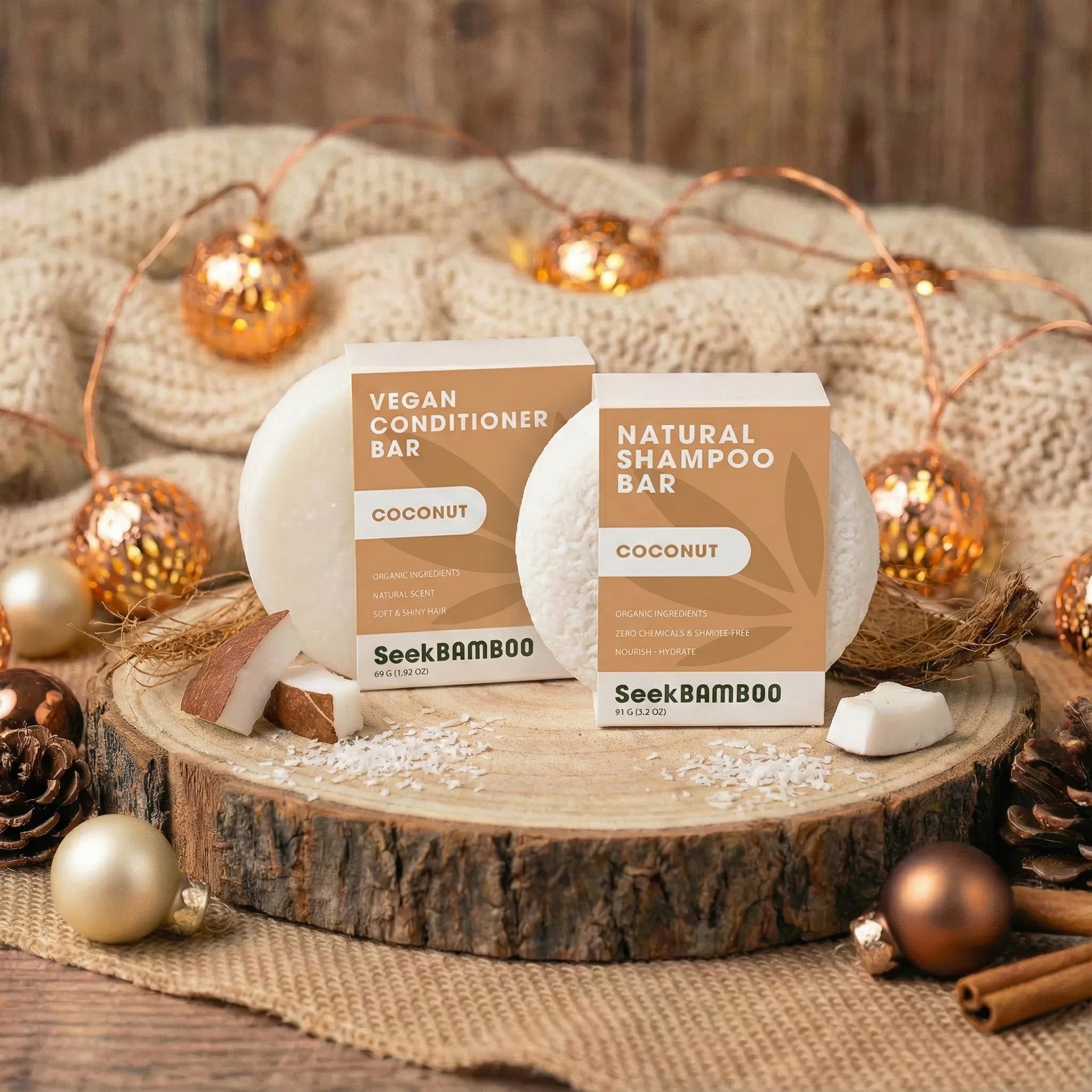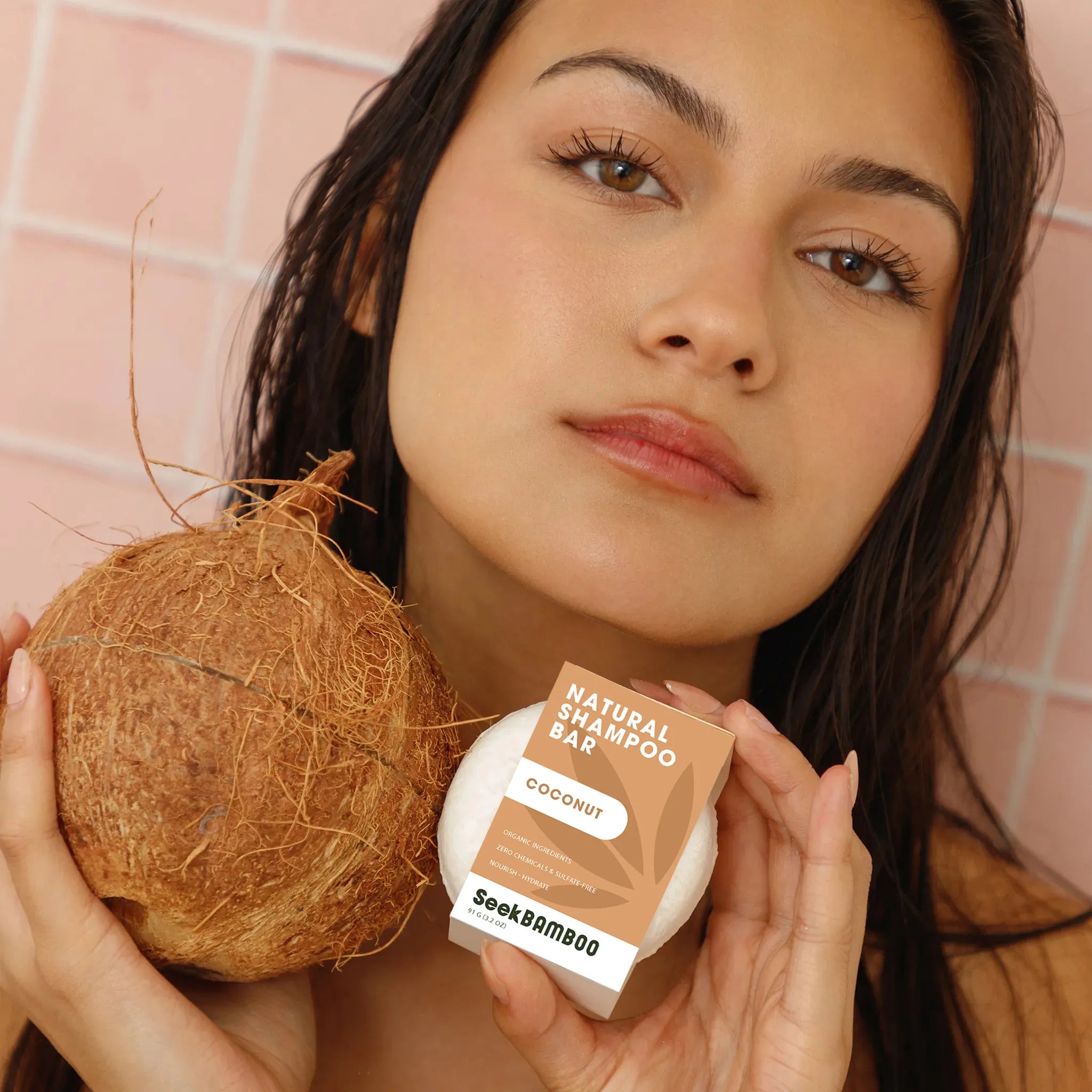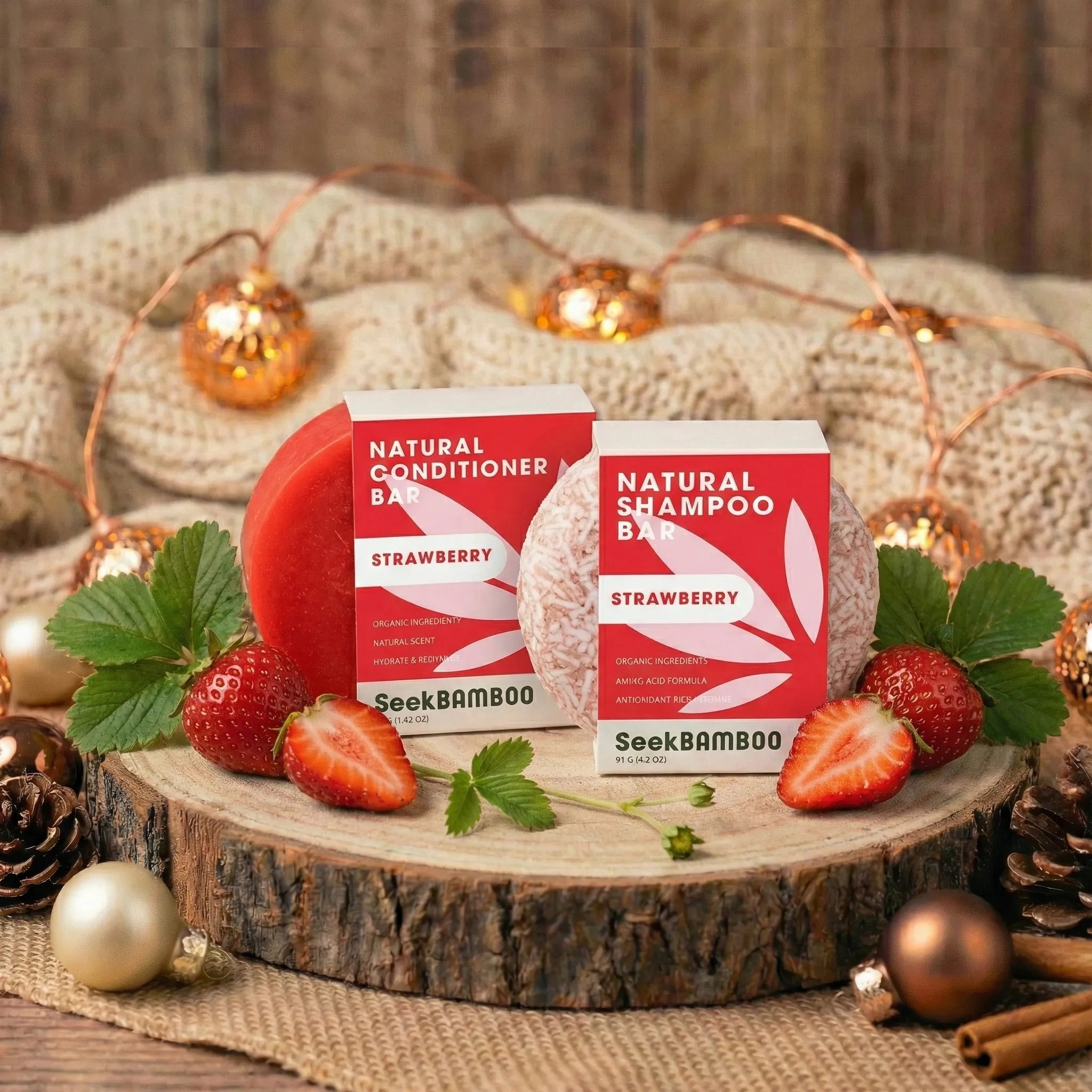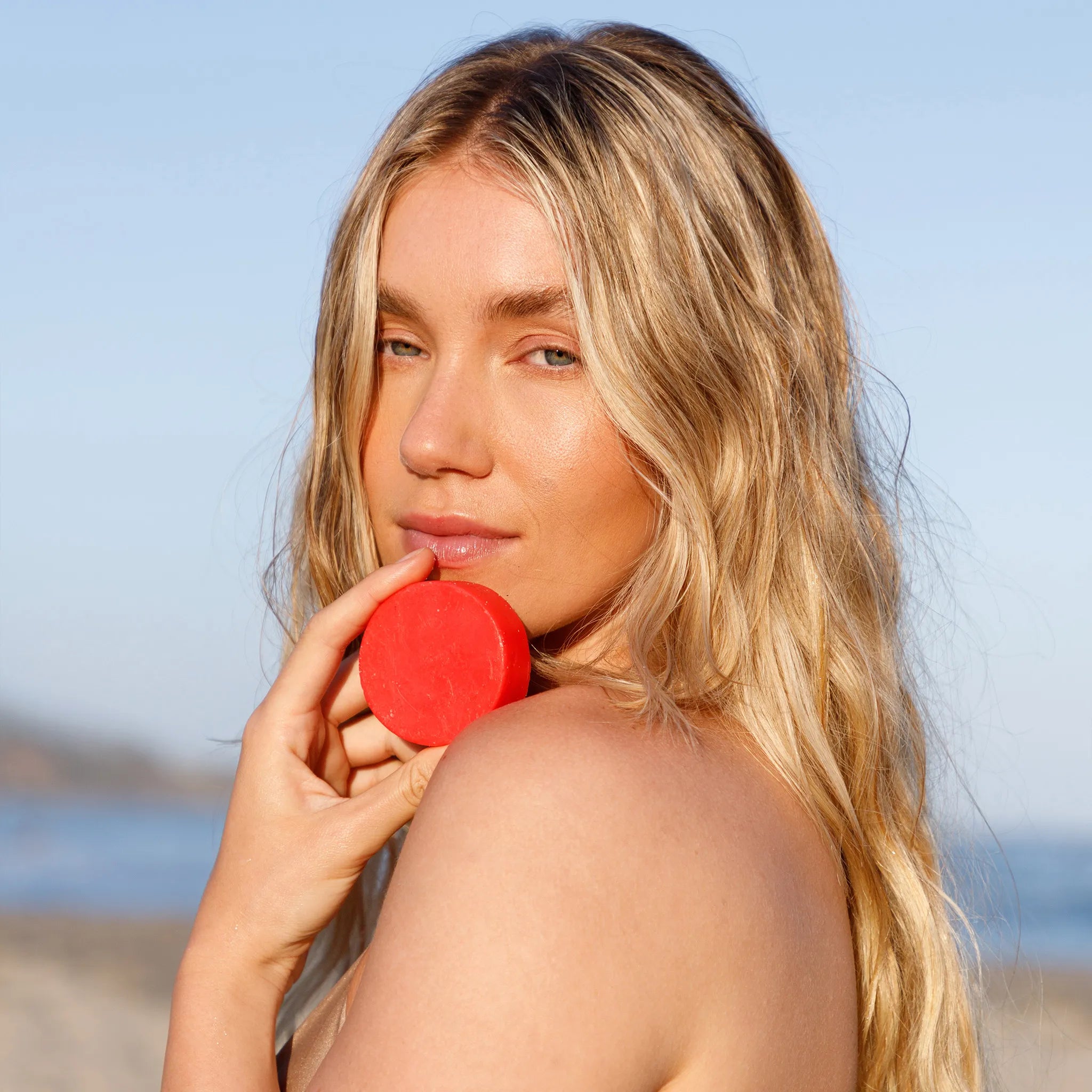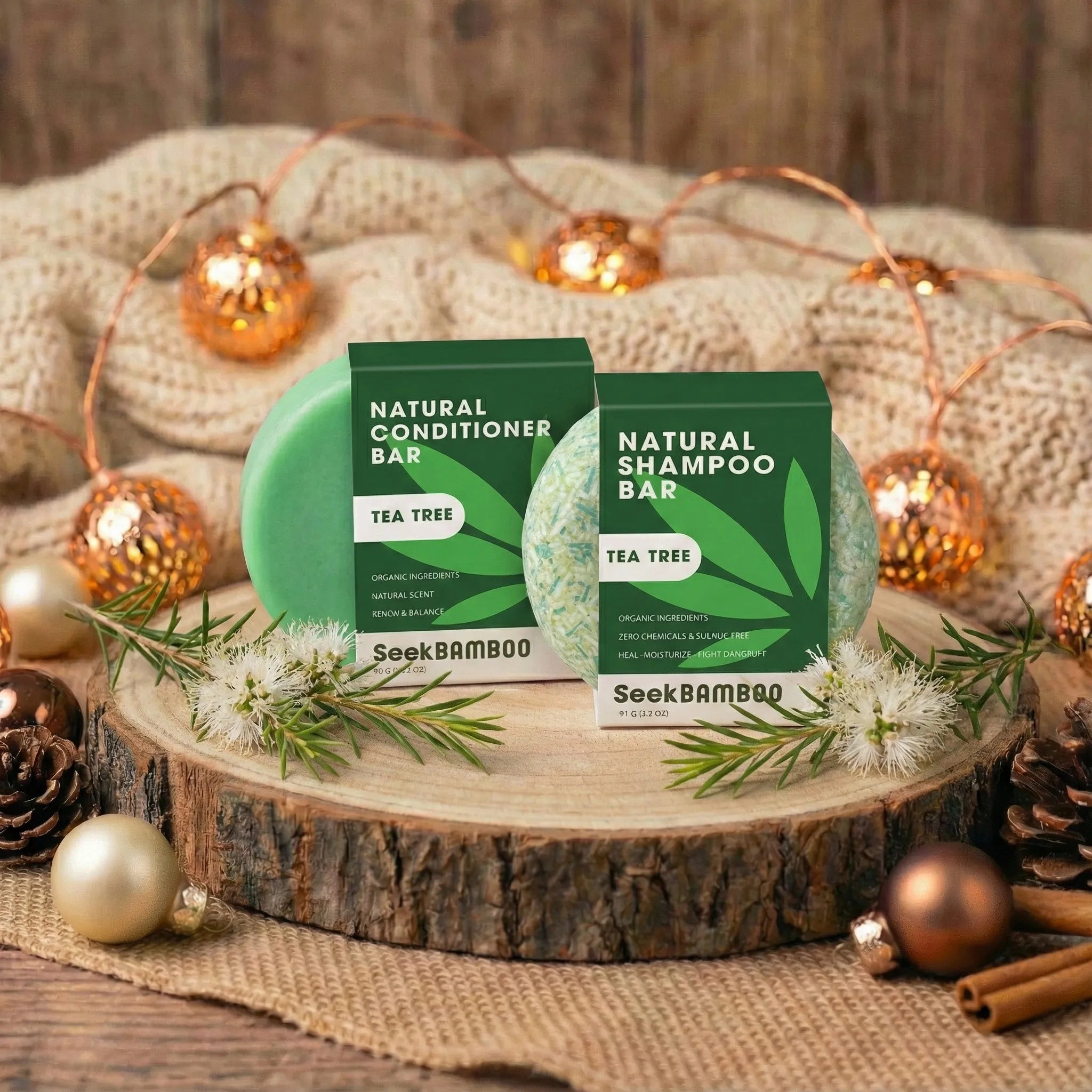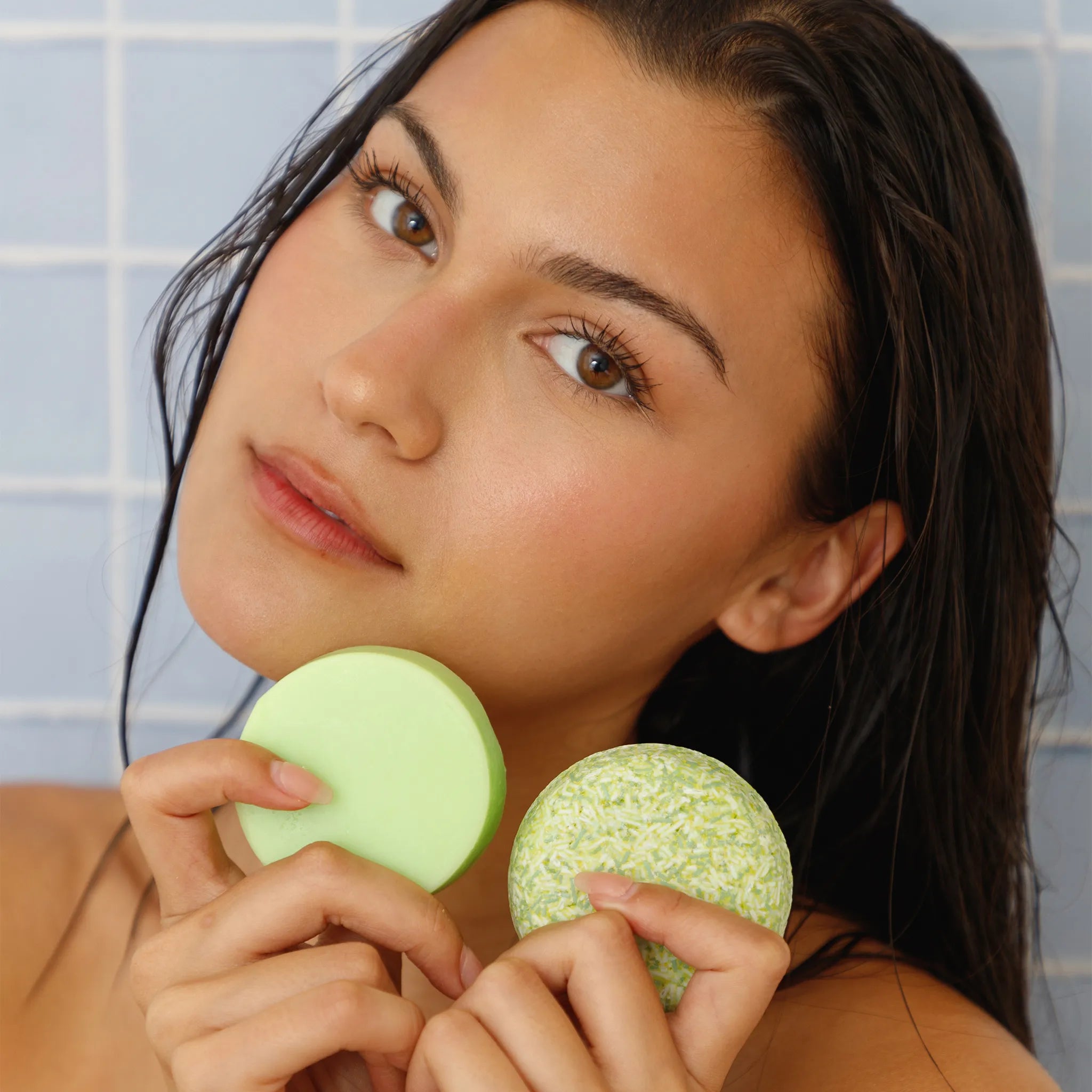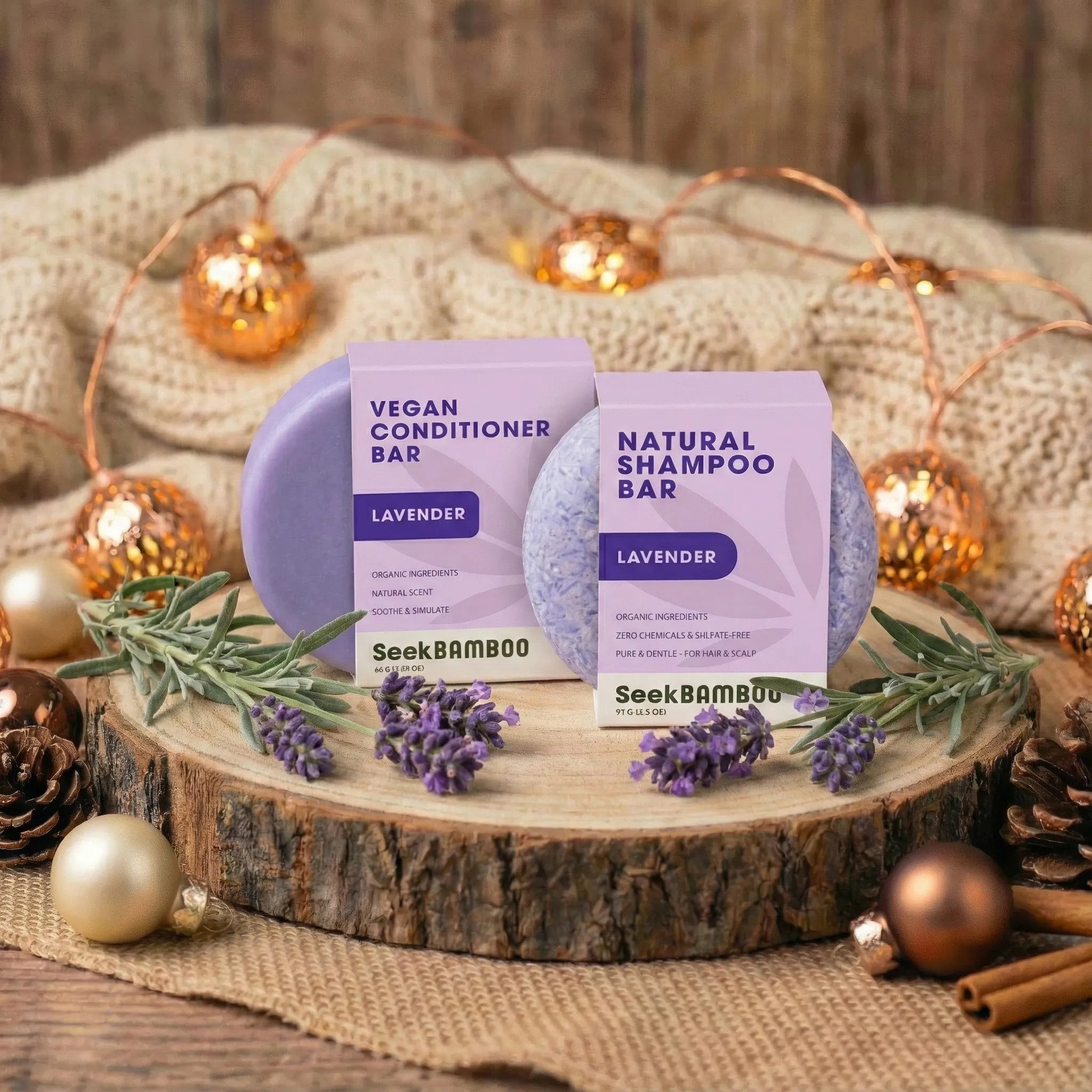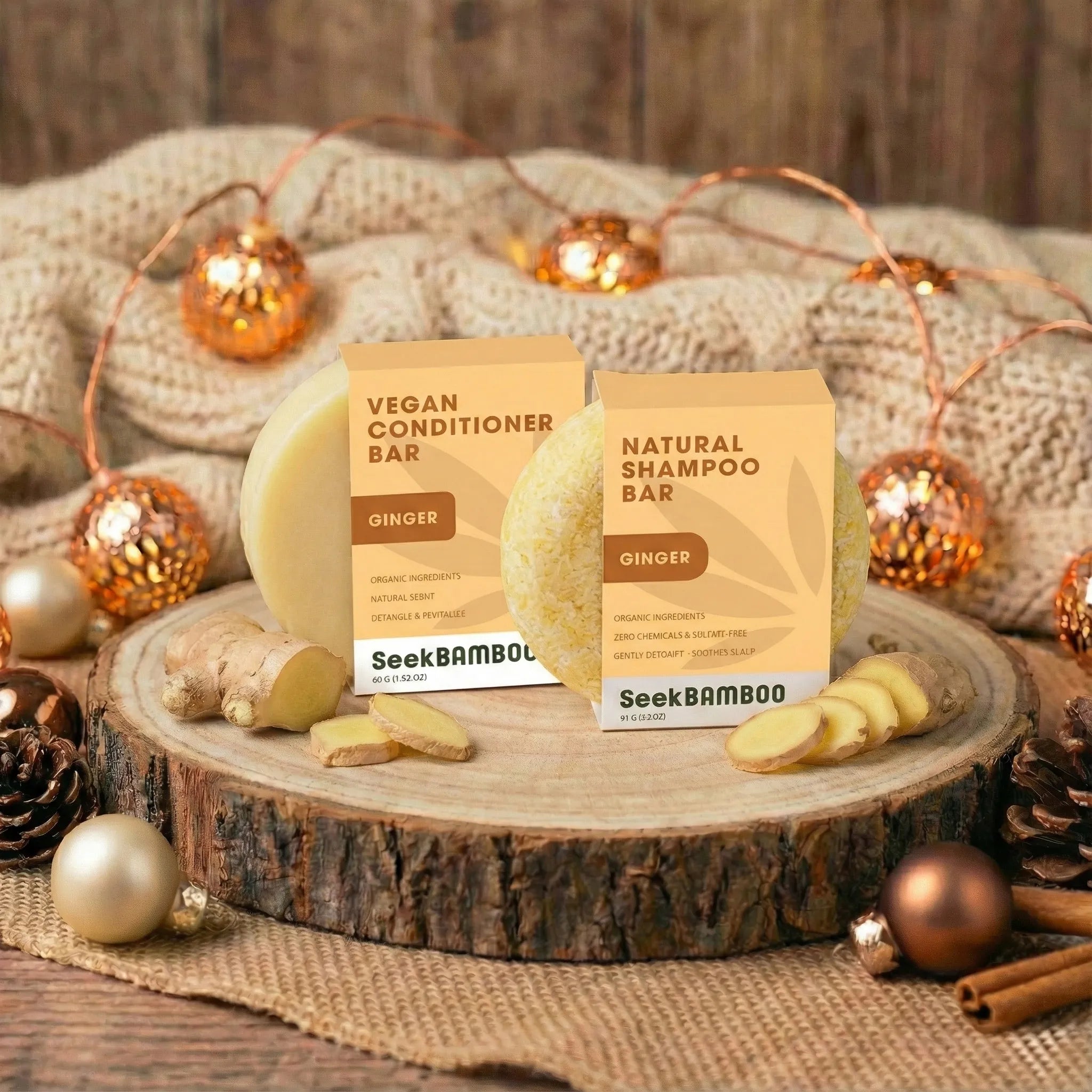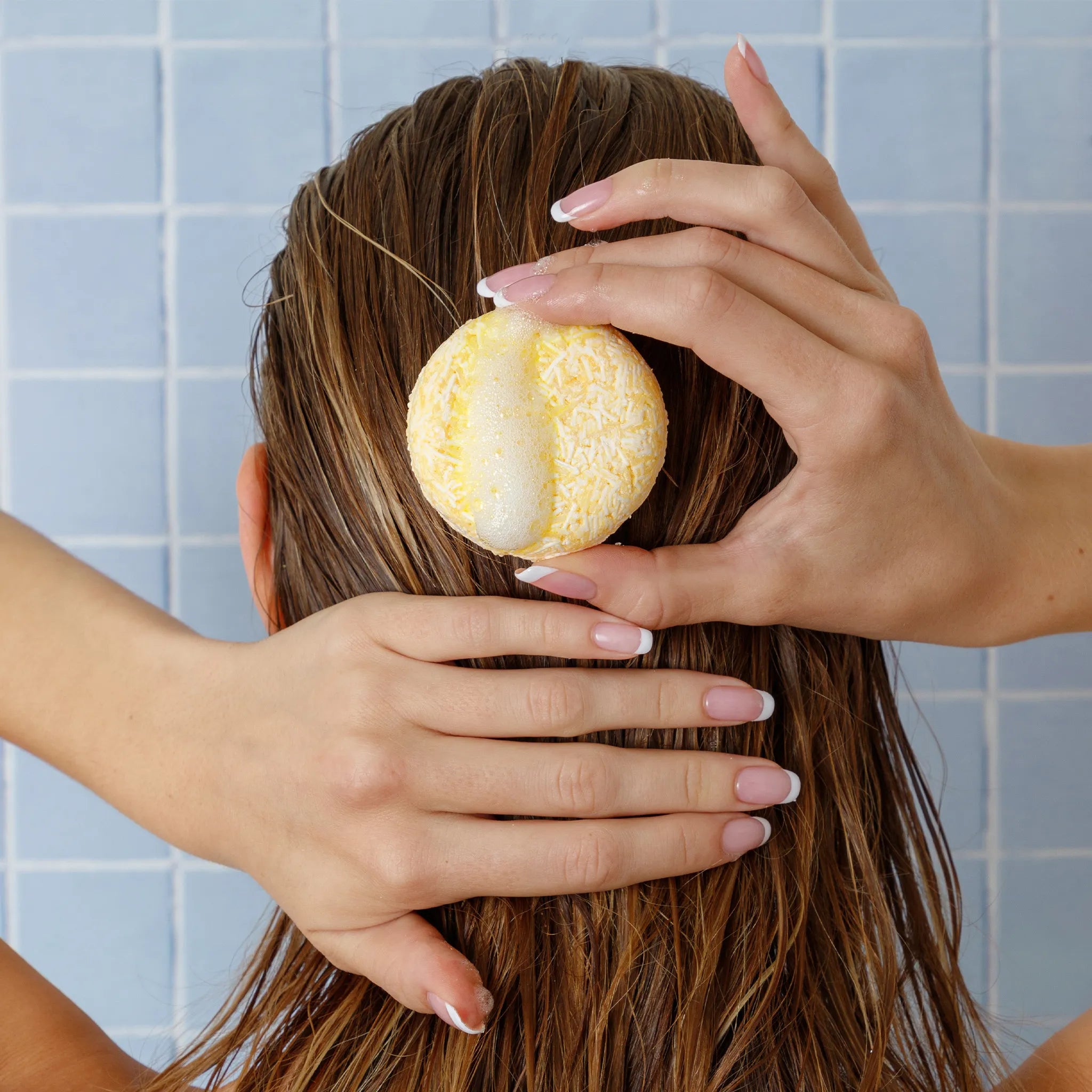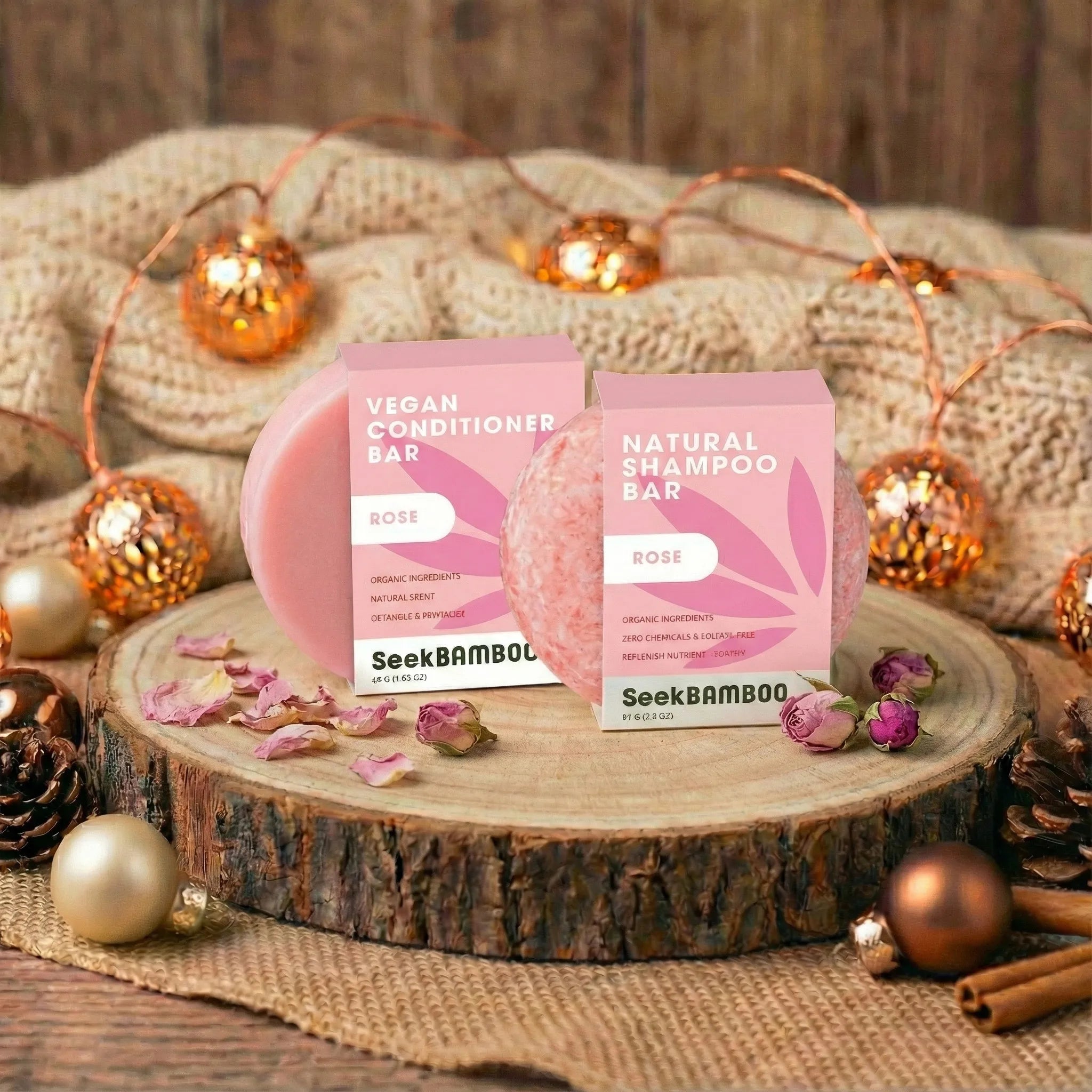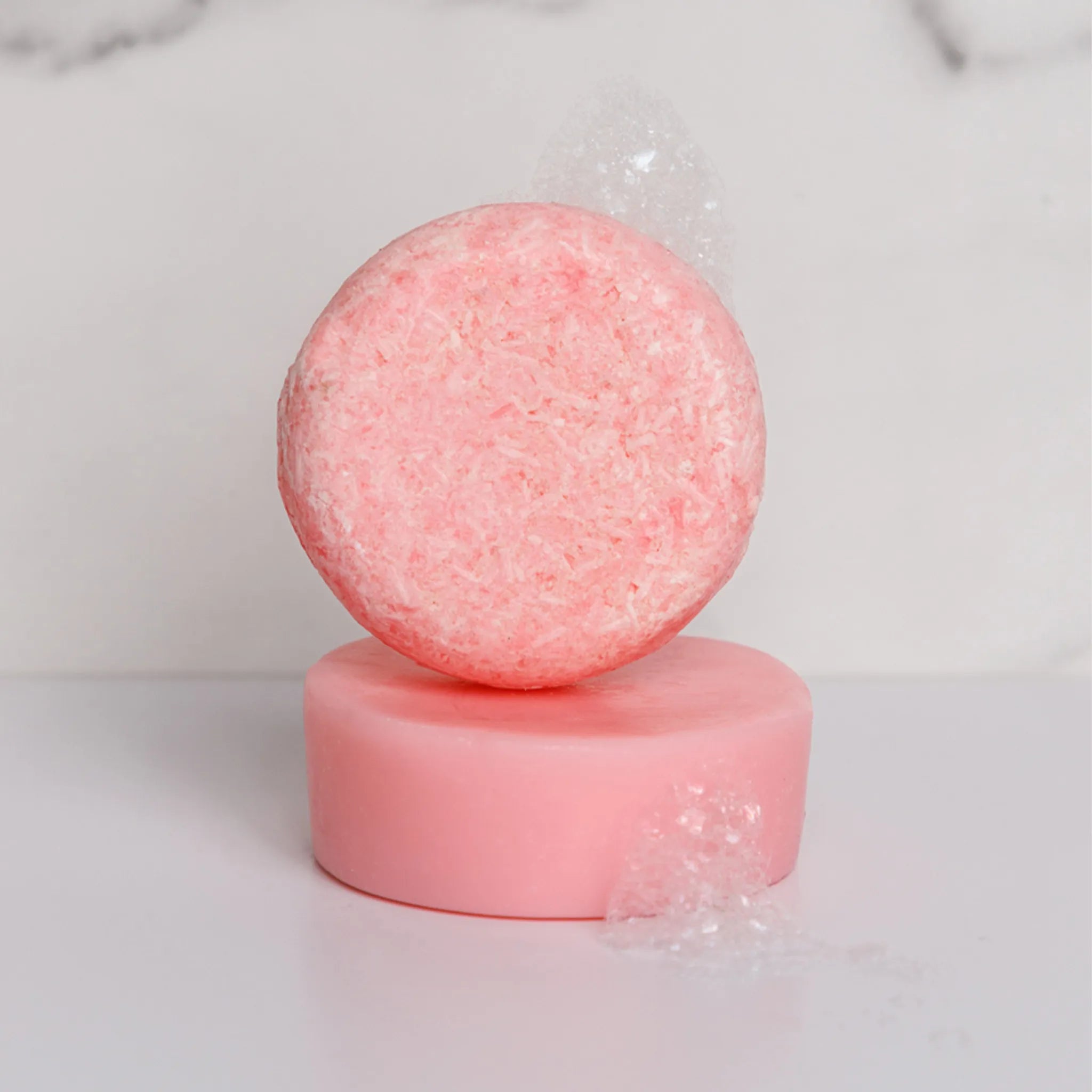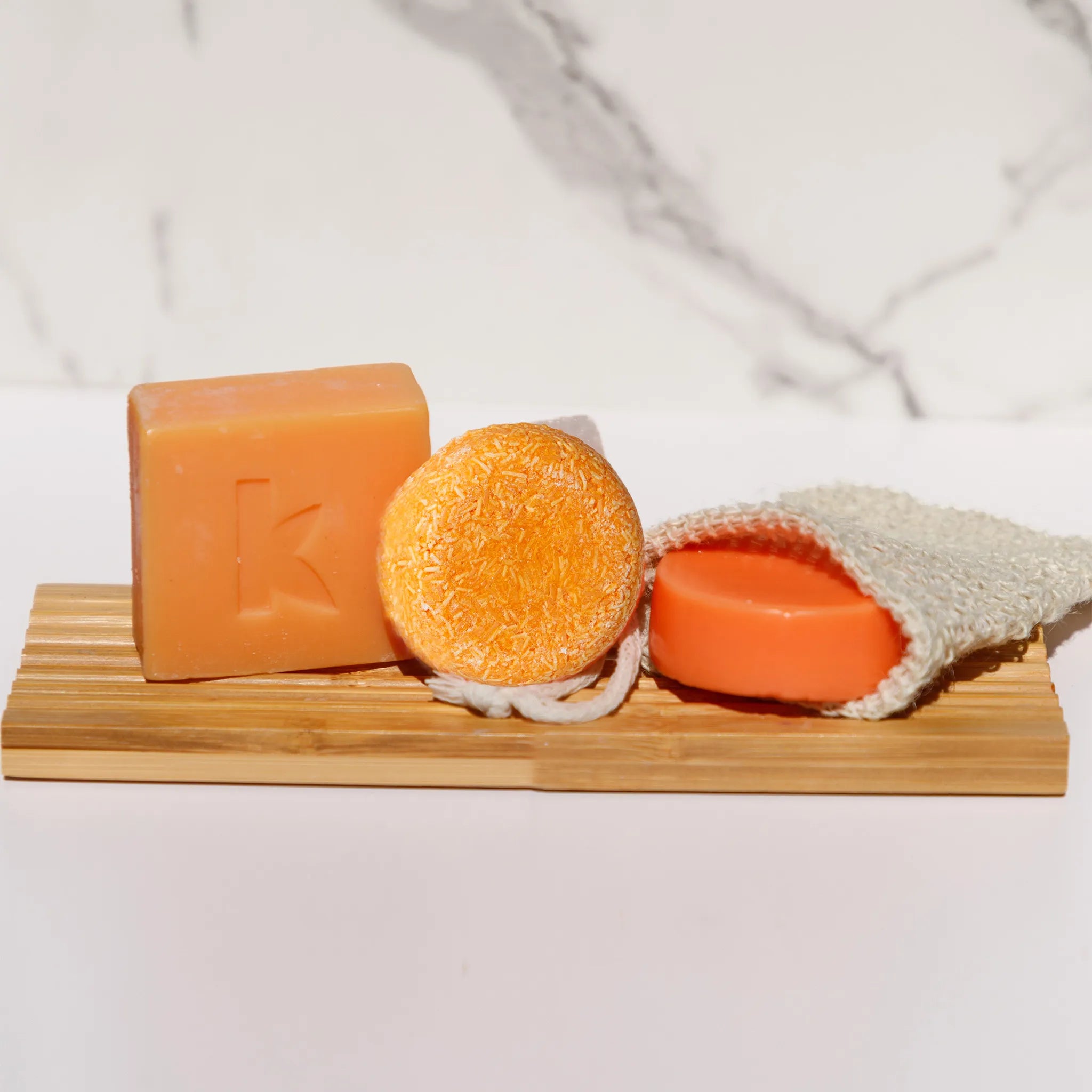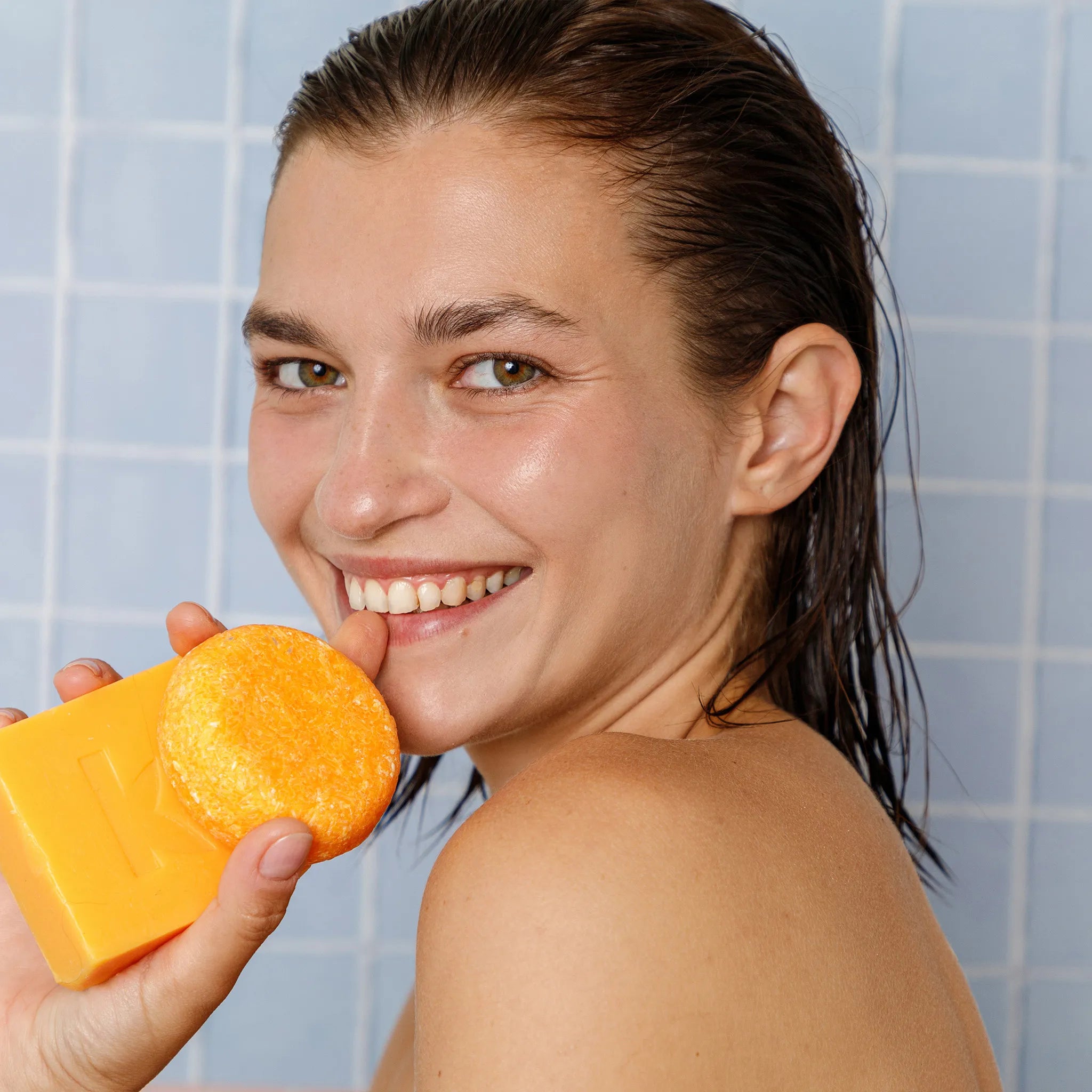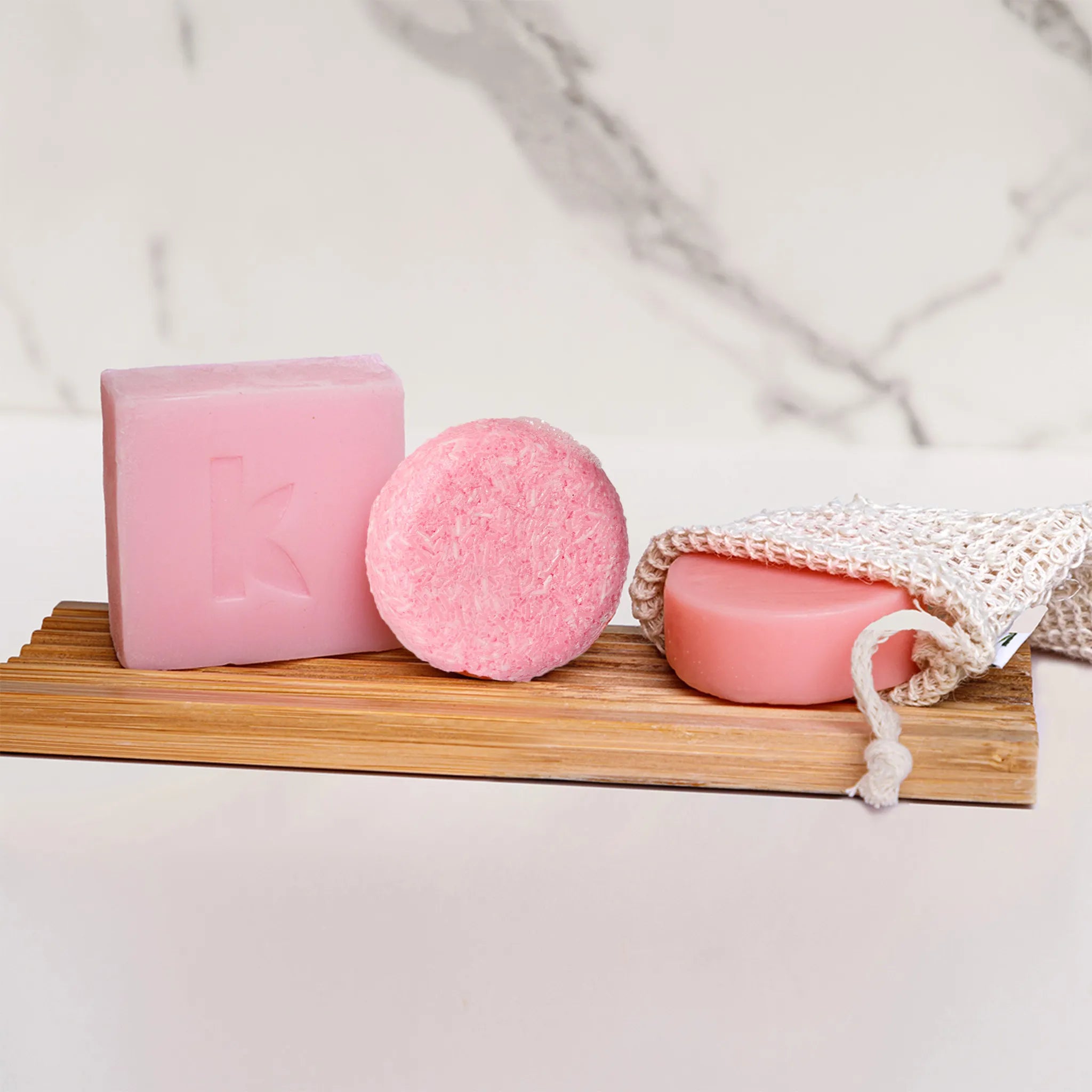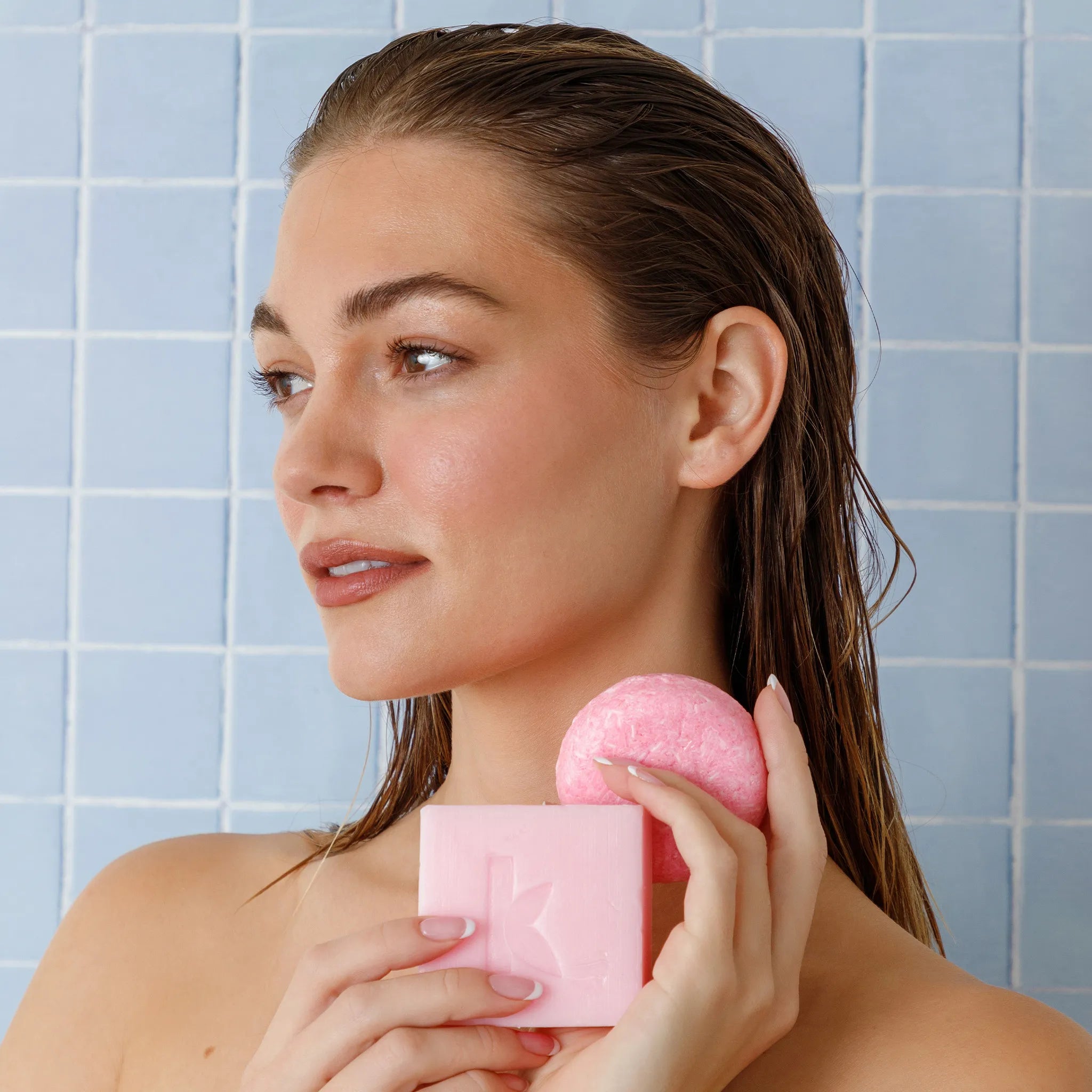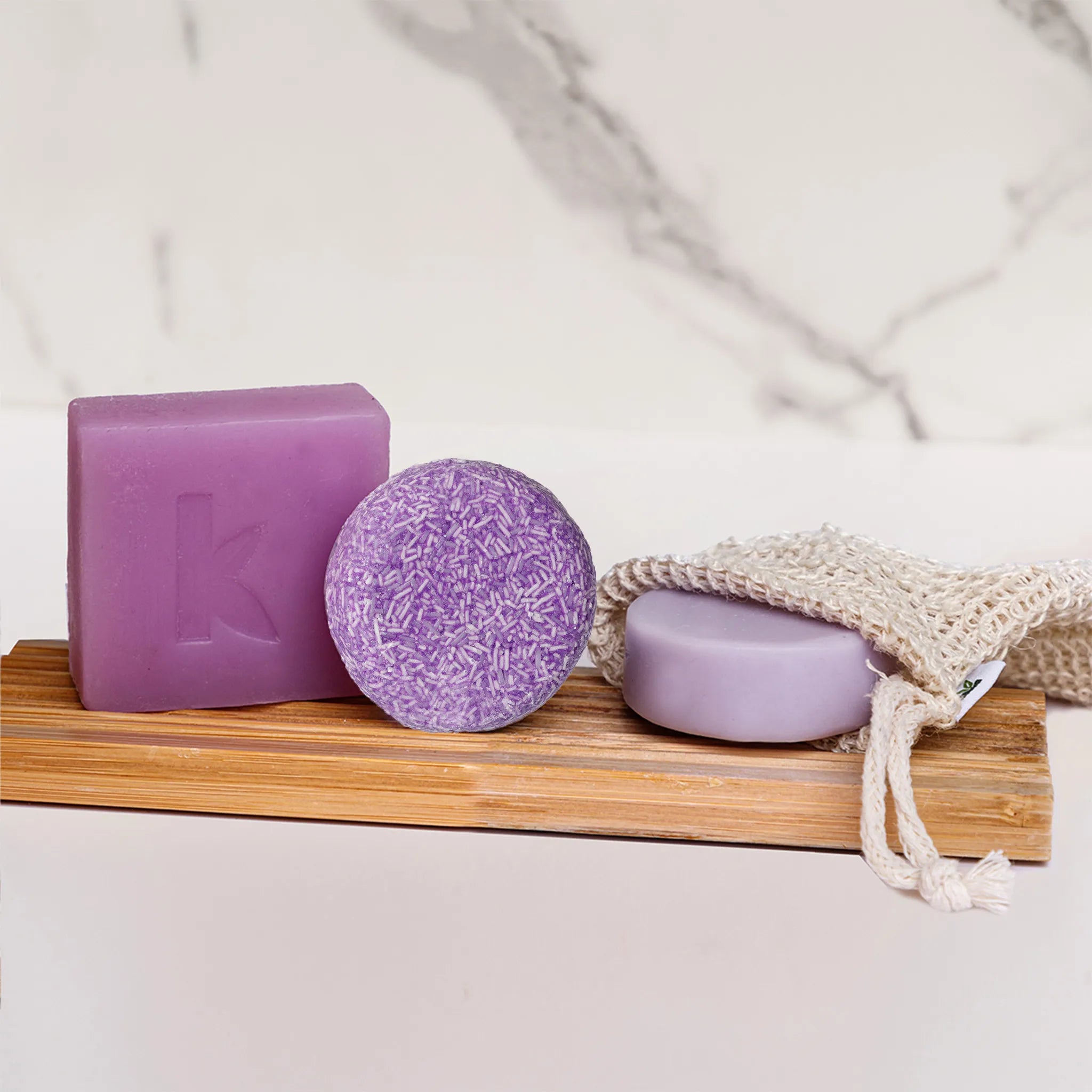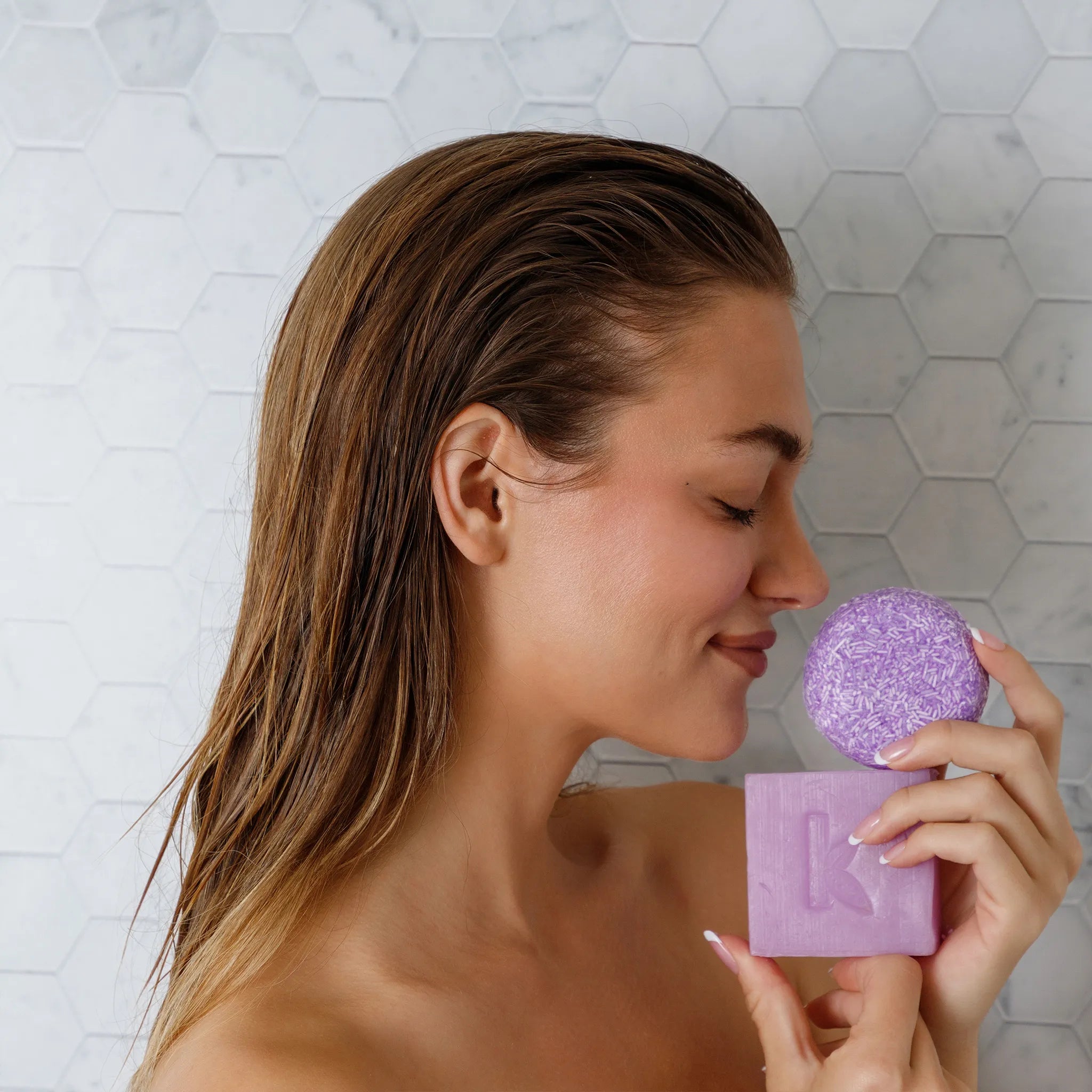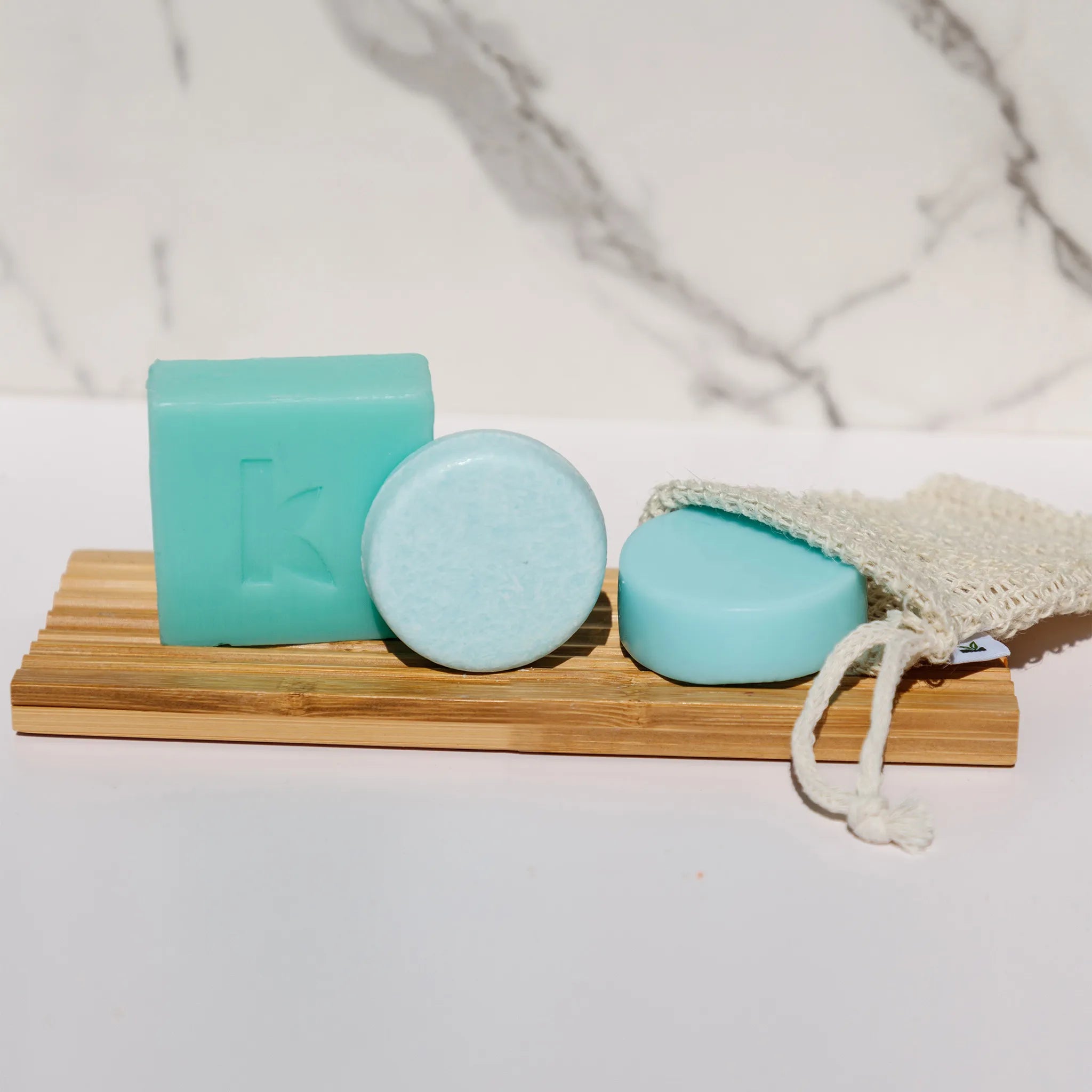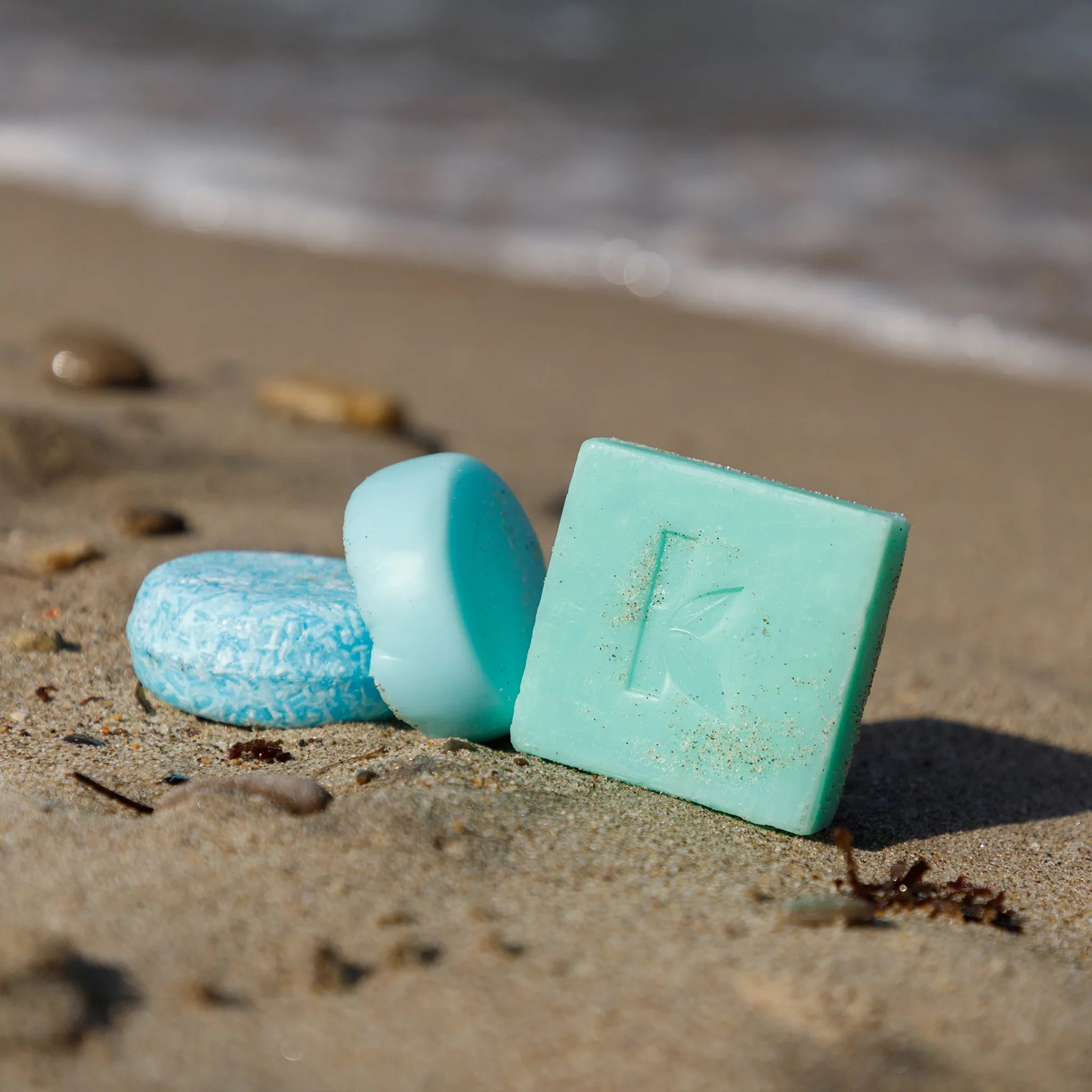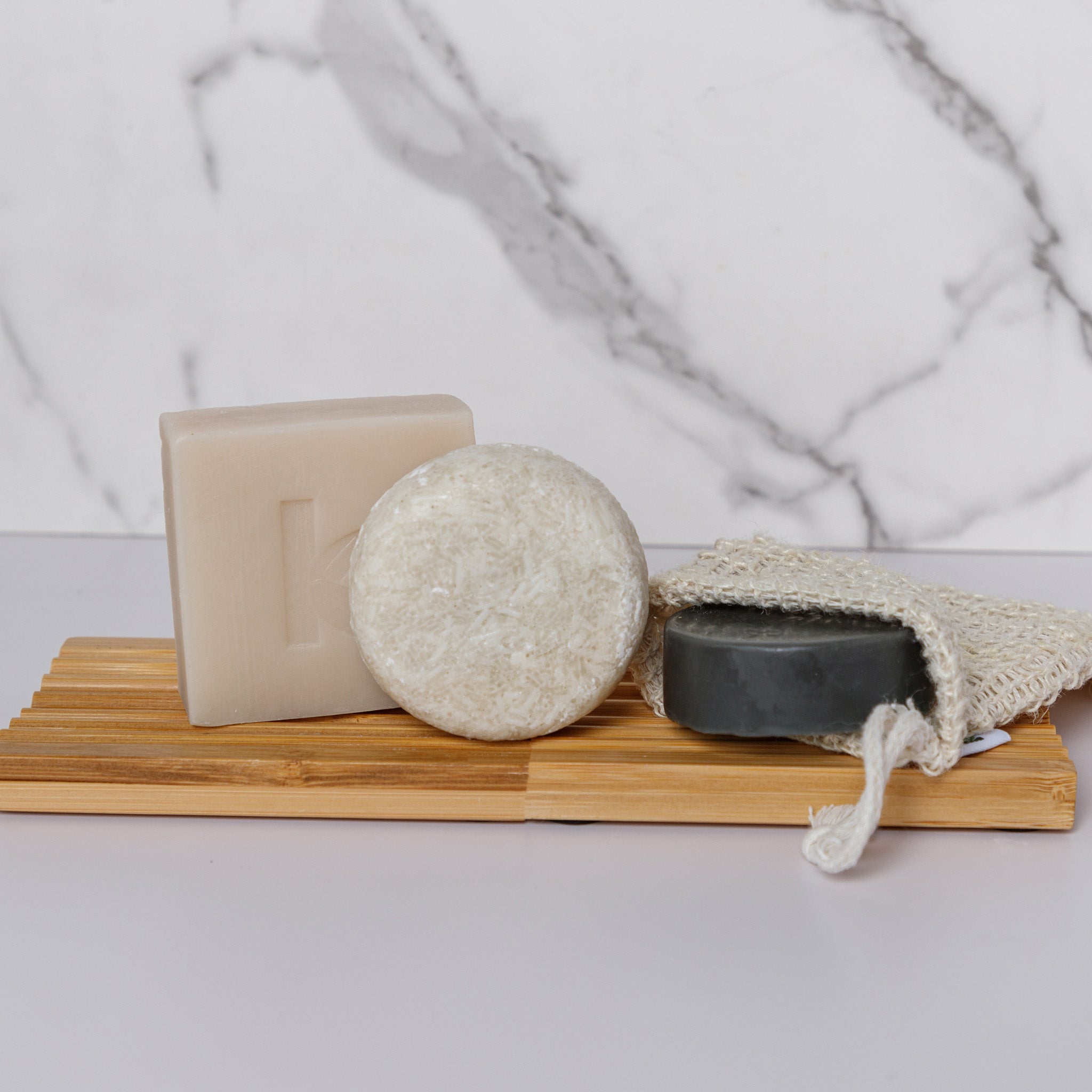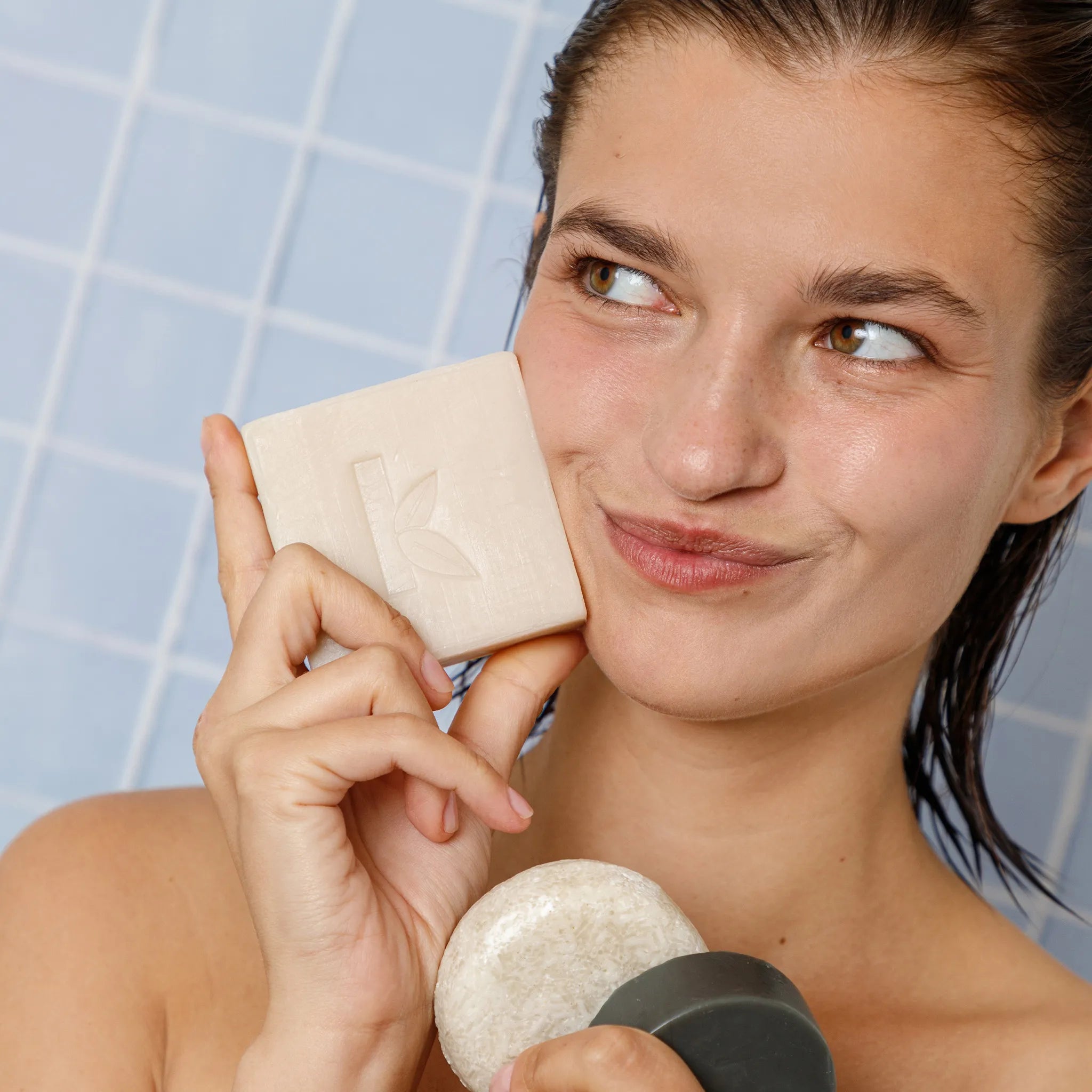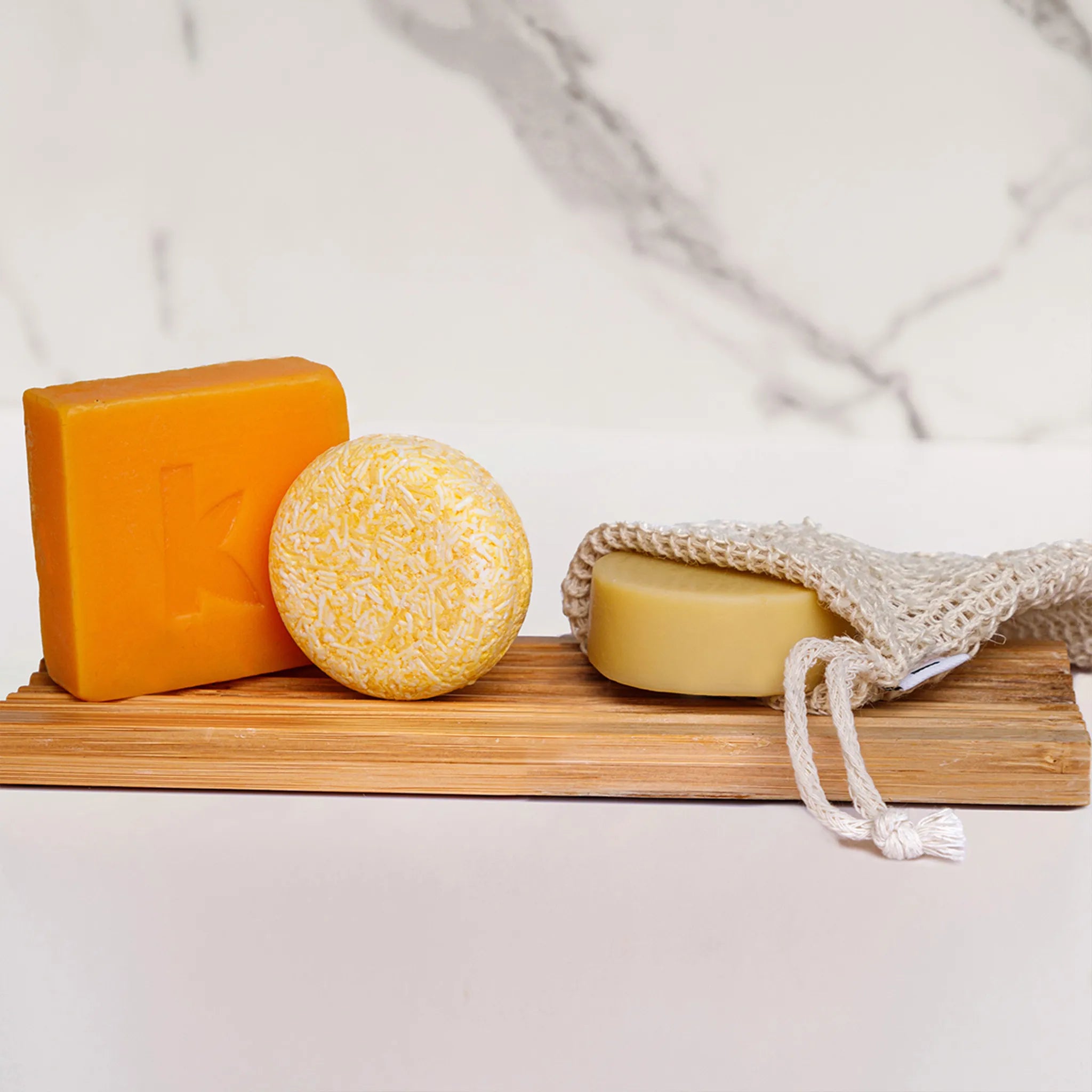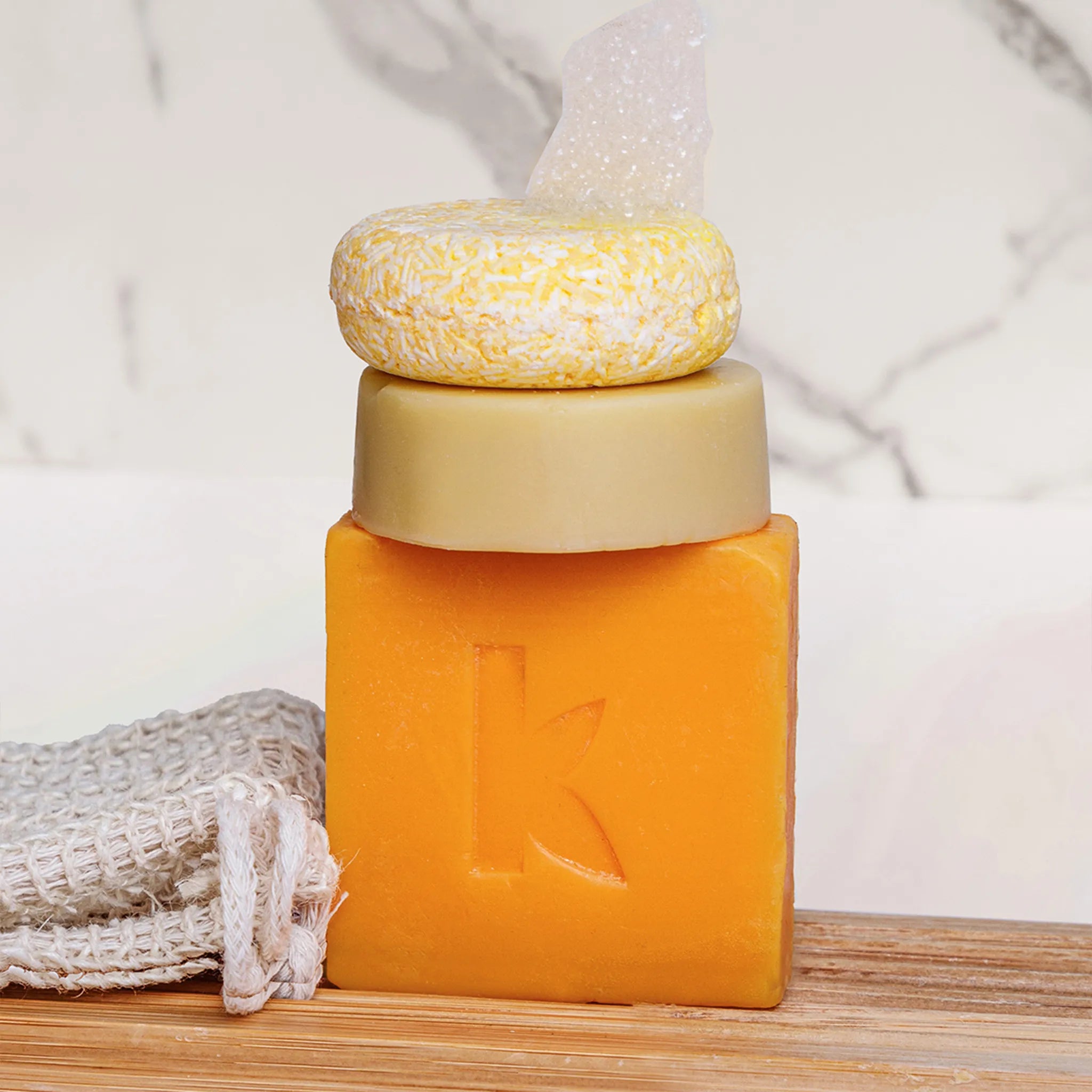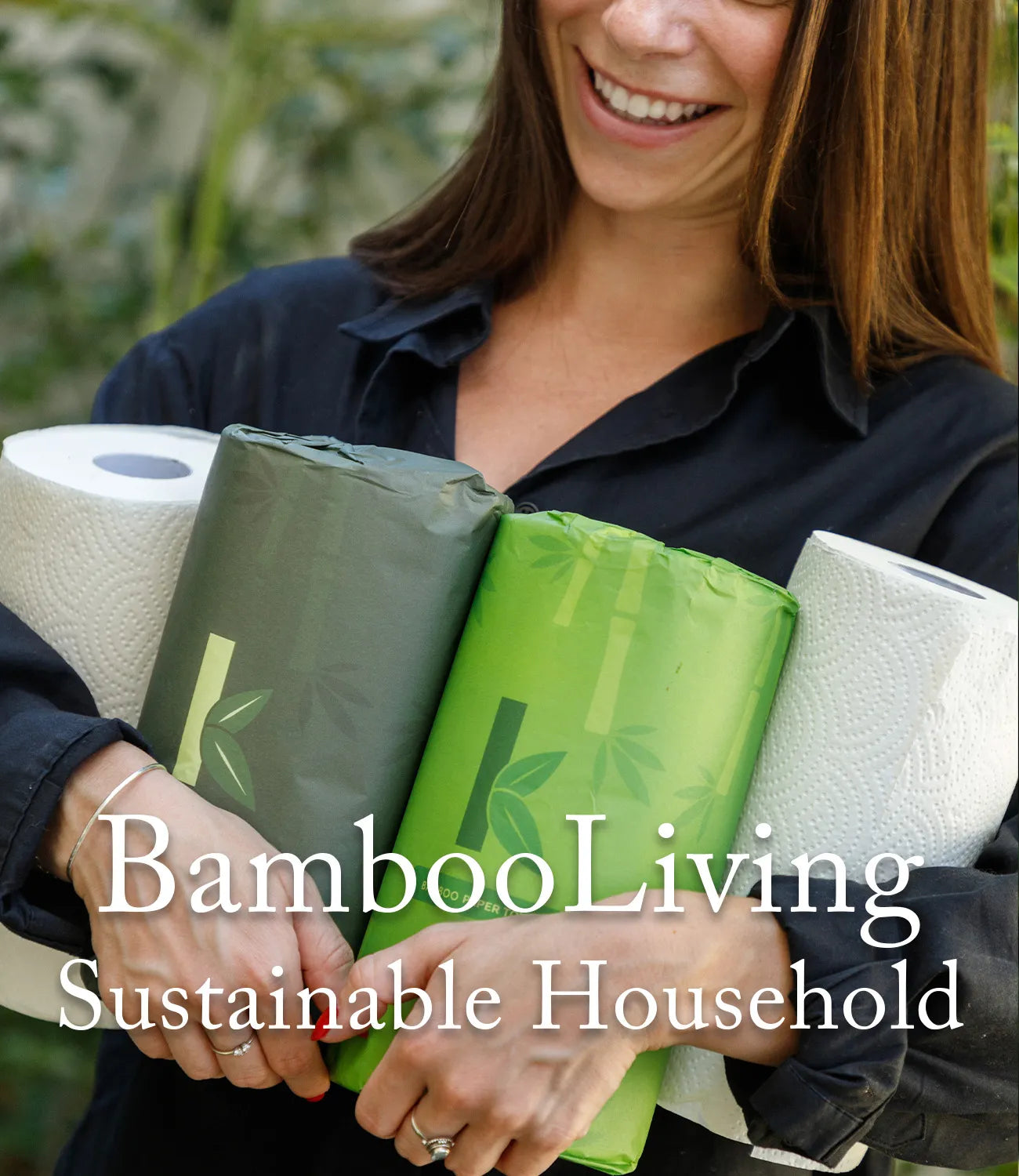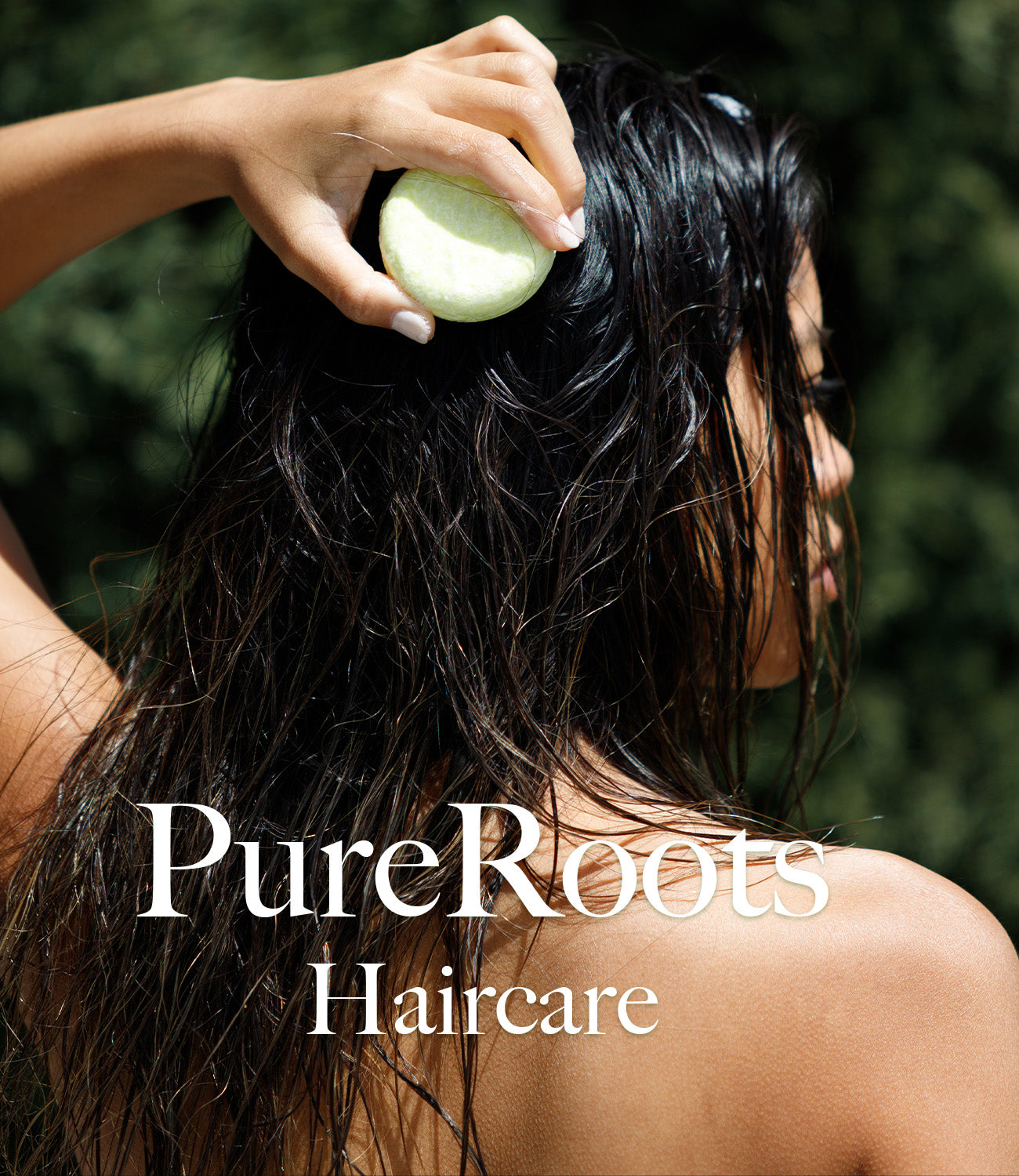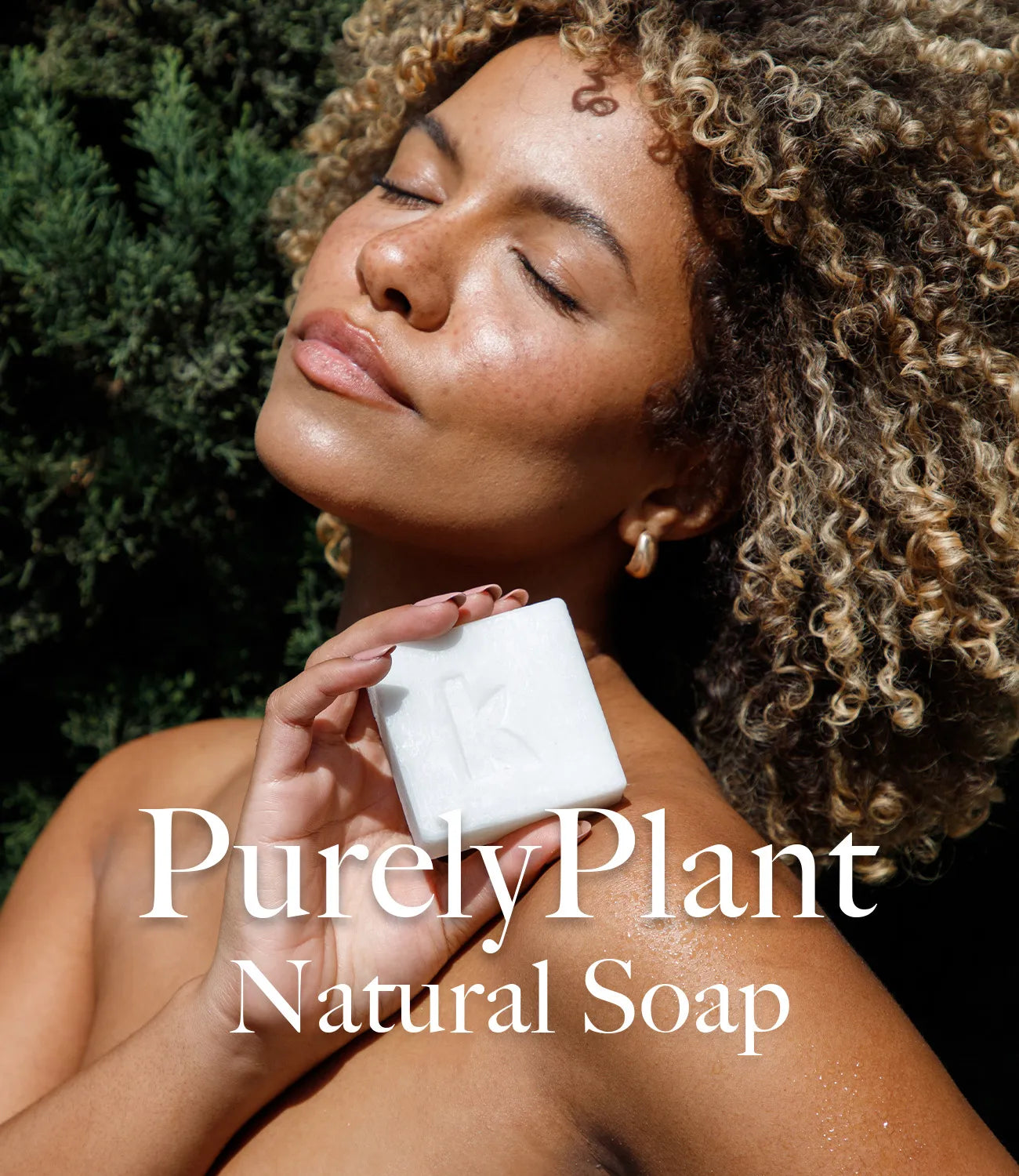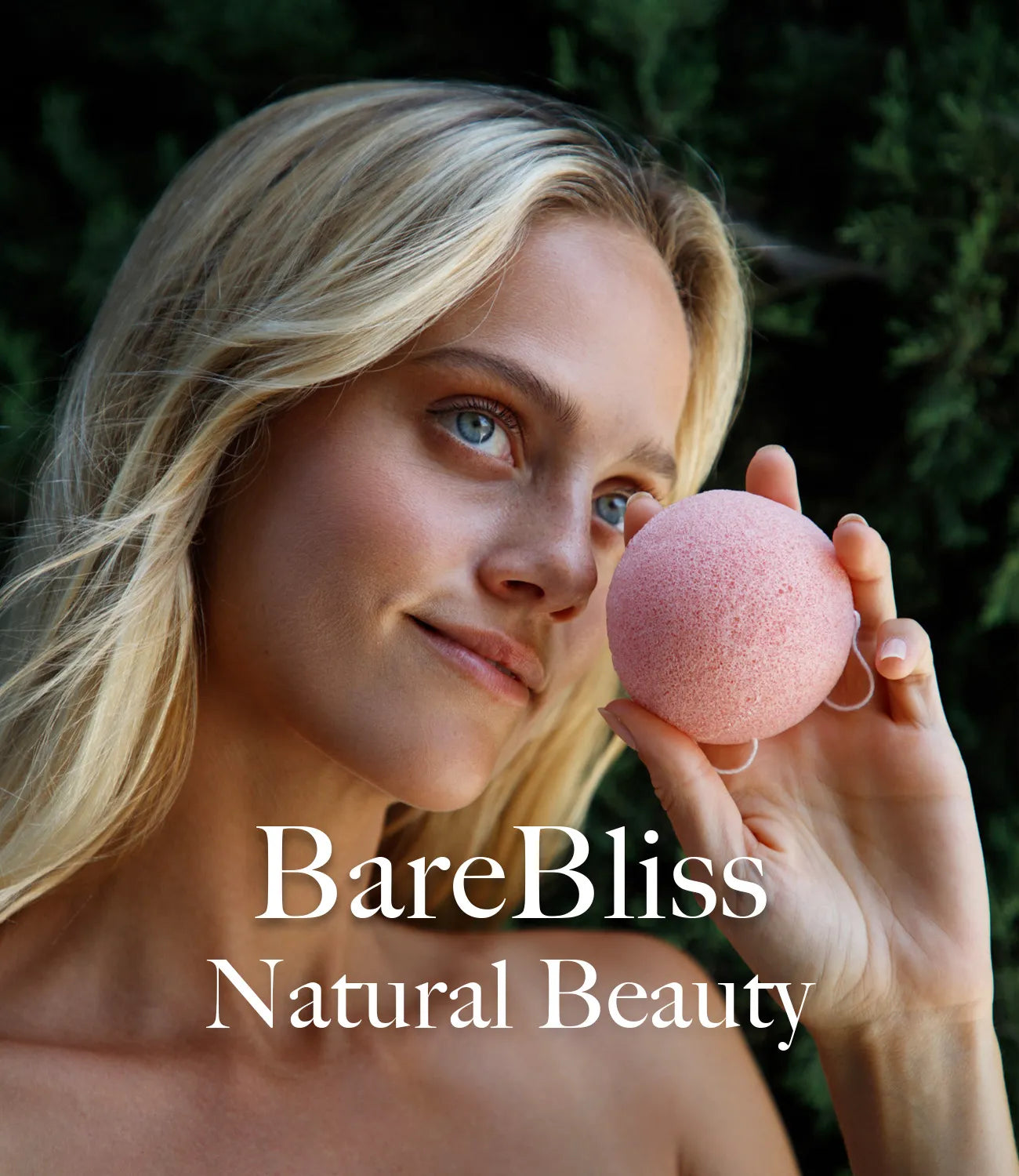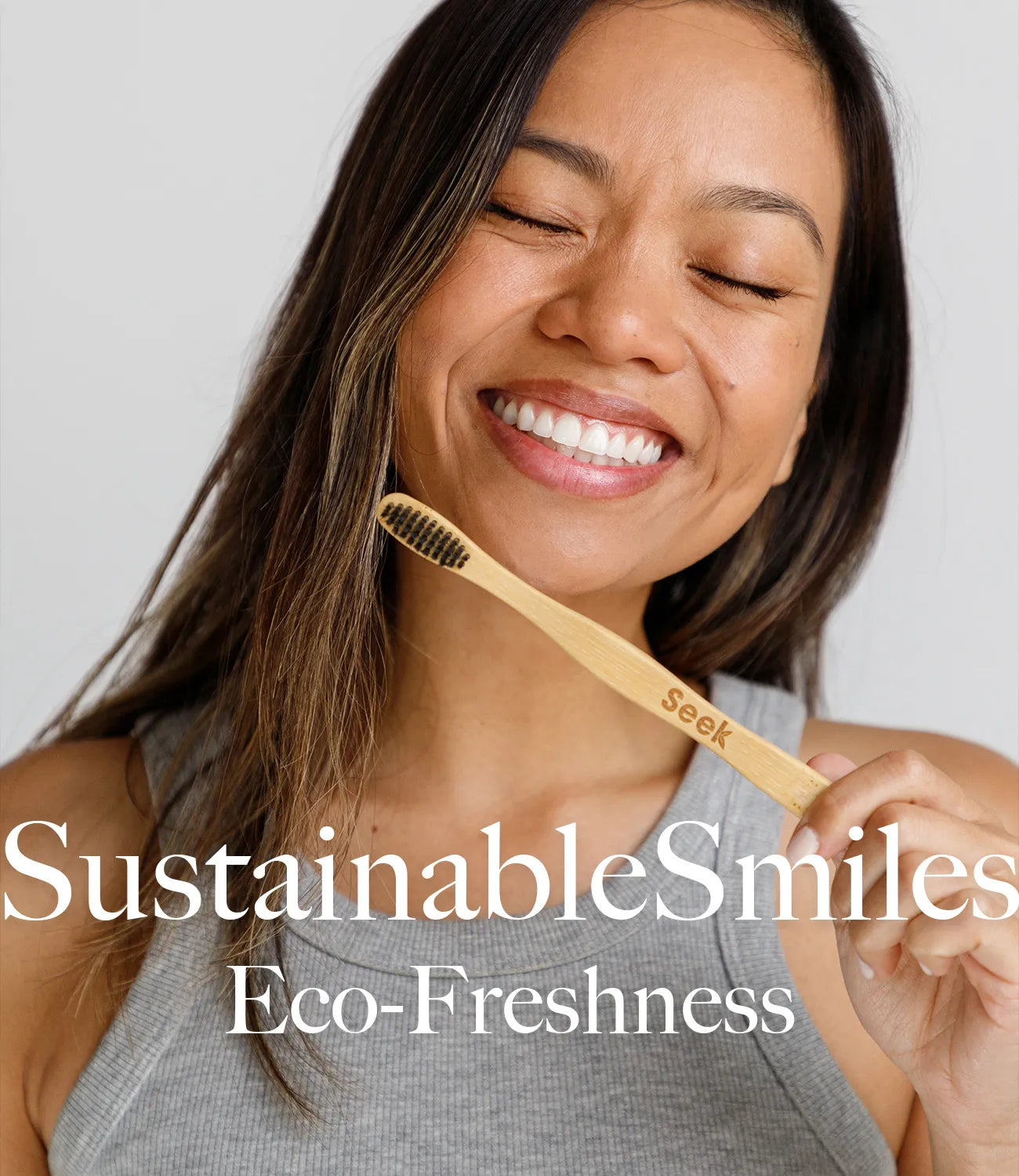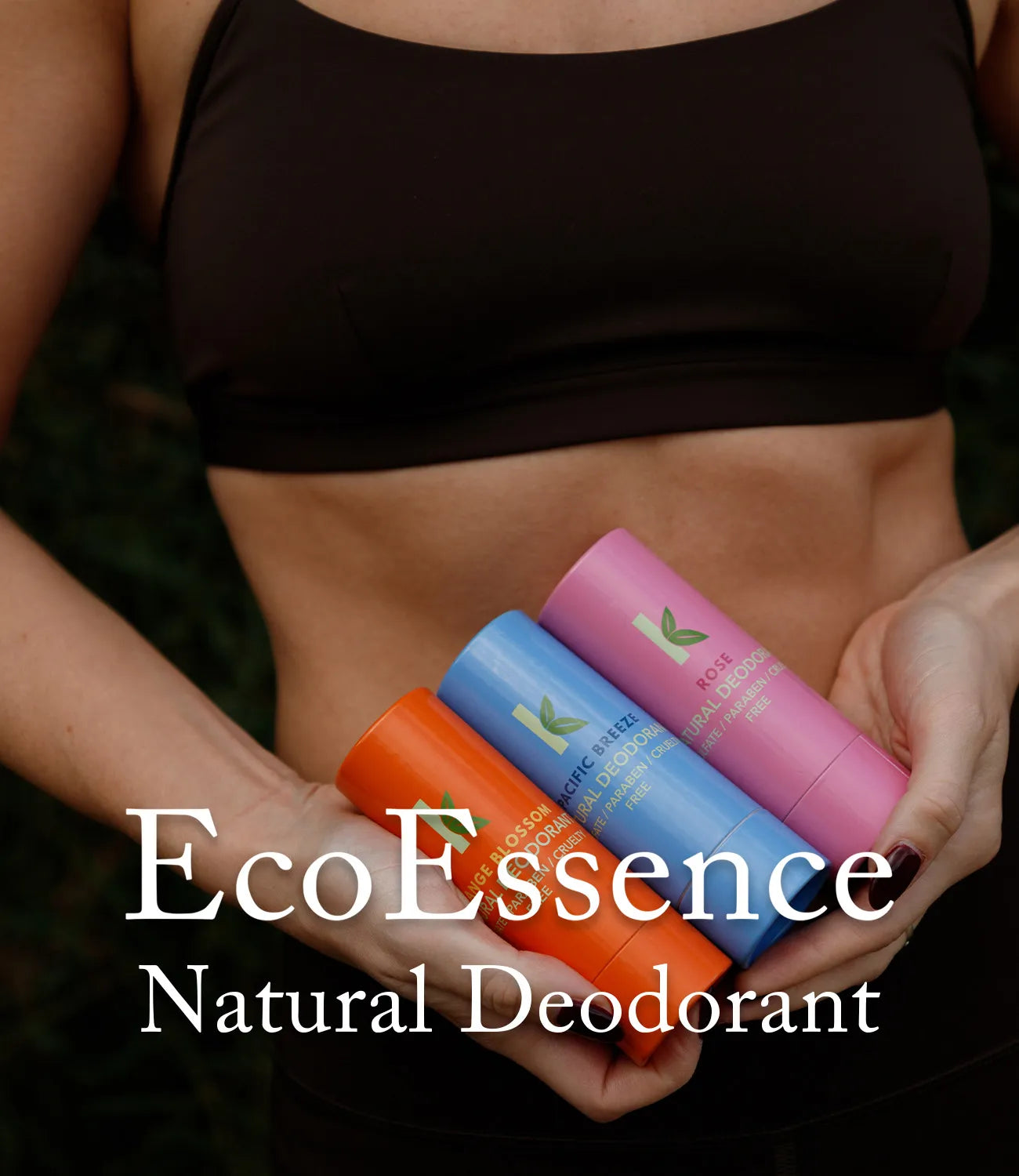Understanding Dry Hair
Dry hair is a common concern for many people, and it can be frustrating when your locks lack the softness, shine, and moisture they deserve. But what exactly causes dry hair? Several factors contribute to this condition, and understanding them can help you take the right steps to restore your hair’s health.
From environmental factors like harsh weather to daily habits like heat styling and chemical treatments, dry hair can result from a range of influences. Sometimes, the root cause is as simple as a lack of moisture, but often it’s a combination of factors that leave your hair feeling brittle and unmanageable. In this blog, we’ll dive into the most common causes of dry hair and explore effective ways to treat it—starting with the best natural shampoo bars that can nourish and hydrate your hair from the roots up.
Common Causes of Dry Hair
Dry hair is a common issue, but understanding the specific causes can help you find the right solutions for restoring moisture and shine. Below are the most prevalent causes of dry hair, along with tips for addressing them.
Environmental Stressors
The environment can have a significant impact on the moisture levels of your hair. Changes in temperature, humidity, and air quality can all contribute to dryness.
- Cold Weather: In the winter, the air tends to be drier and colder, which can strip moisture from your hair and scalp. Indoor heating systems further dry out the air, which can leave your hair feeling brittle and dull.
- Hot Weather: Sun exposure in the summer can also lead to dry hair. UV rays break down the proteins in your hair, leading to dryness and frizz. Chlorine from swimming pools can also exacerbate this effect, leaving hair feeling rough and parched.
What You Can Do:
- Protect Your Hair: Wear a hat or scarf to protect your hair from extreme weather.
- Use Moisturizing Products: Invest in a natural shampoo bar that is formulated with nourishing oils like jojoba or argan, which can help maintain moisture during harsh weather.
- Deep Conditioning: During periods of extreme weather, deep condition your hair to provide added hydration.
Excessive Heat Styling
Heat styling tools such as blow dryers, flat irons, and curling irons can cause major damage to your hair if used too frequently. The high temperatures from these devices break down your hair's natural oils and can leave your strands feeling dry and brittle.
- Blow Dryers: Frequent use of blow dryers can strip moisture from your hair, especially if used on high heat settings.
- Flat Irons and Curling Irons: These styling tools can directly damage the hair cuticle, causing it to lose moisture and become dry over time.
What You Can Do:
- Reduce Heat Styling: Try to limit the use of heat styling tools. Embrace air drying whenever possible.
- Use a Heat Protectant: When styling with heat, apply a natural heat protectant to safeguard your hair from damage.
- Opt for a Nourishing Shampoo Bar: Use a moisturizing natural shampoo bar to replenish the moisture lost from heat styling.
Chemical Treatments
Frequent chemical treatments, such as hair coloring, bleaching, and perming, can strip your hair of its natural moisture. These processes break down the hair’s structure, leaving it more porous and susceptible to dryness and damage. Over time, this can lead to hair that feels coarse and lacks its natural softness.
What You Can Do:
- Minimize Chemical Treatments: Limit the number of chemical treatments you undergo, and choose gentler options that are free from harsh chemicals.
- Hydrate Deeply: After any chemical treatment, use a deep-conditioning treatment or a natural shampoo bar with moisturizing properties to restore lost hydration.
Overwashing Your Hair
Washing your hair too often can lead to dryness by stripping it of its natural oils. These oils help to keep your hair hydrated and protected, and overwashing can cause your scalp to produce more oil to compensate, leading to imbalances.
What You Can Do:
- Wash Less Frequently: If you have dry hair, try to wash your hair 2-3 times a week instead of daily to allow your scalp to retain its natural oils.
- Use a Mild, Moisturizing Shampoo: Choose a natural shampoo bar that is sulfate-free and formulated to cleanse without stripping essential oils.
Lack of Proper Nutrition
The health of your hair is closely tied to what you eat. A poor diet lacking in essential vitamins and nutrients can contribute to dry, brittle hair. Specifically, vitamins A, C, D, and E, as well as biotin and omega-3 fatty acids, are crucial for maintaining healthy hair.
- Nutrient Deficiencies: If your diet is deficient in essential nutrients, your hair may suffer from dryness, thinning, or slow growth.
- Hydration Issues: Inadequate water intake can lead to dehydrated hair, leaving it dry and lackluster.
What You Can Do:
- Eat a Balanced Diet: Incorporate nutrient-rich foods like fatty fish, nuts, seeds, and leafy greens into your diet to support healthy hair.
- Stay Hydrated: Drink plenty of water throughout the day to keep your hair hydrated from the inside out.
Harsh Hair Products
Many conventional shampoos and conditioners contain sulfates, parabens, and alcohol-based ingredients, which can dry out the hair and scalp. These harsh chemicals strip the hair of its natural oils and leave it more vulnerable to damage.
What You Can Do:
- Switch to Natural Hair Care: Opt for natural, sulfate-free shampoos and conditioners, like your moisturizing shampoo bars, which are formulated with gentle, hydrating ingredients.
- Avoid Synthetic Fragrances: Choose products that are free from synthetic fragrances, as these can irritate the scalp and contribute to dryness.
Health Conditions
Certain medical conditions, such as hypothyroidism, eczema, and psoriasis, can lead to dry hair. Hormonal changes, particularly those experienced during pregnancy, menopause, or stress, can also affect hair health.
What You Can Do:
- Consult with a Doctor: If you suspect that a health condition is affecting your hair, consult with a healthcare provider for proper diagnosis and treatment.
- Use Gentle Hair Care Products: While managing health conditions, use natural, soothing hair care products that can help restore moisture to your hair.
Dry hair can have multiple causes, but by understanding these factors, you can take steps to restore moisture, shine, and overall hair health. Using natural shampoo bars that are free from harsh chemicals and packed with nourishing ingredients is one of the best ways to combat dryness and give your hair the love it deserves.
Why Natural Shampoo Bars Are Ideal
When it comes to caring for dry hair, the products you use play a crucial role in restoring moisture and nourishment. Traditional liquid shampoos often contain harsh chemicals that strip the hair of its natural oils, leaving it feeling even drier and more brittle. That’s where natural shampoo bars come in. Packed with nourishing ingredients, these eco-friendly alternatives provide a gentle yet effective way to hydrate and restore vitality to your dry hair.
Free from Harsh Chemicals
One of the main benefits of natural shampoo bars is that they are typically free from sulfates, parabens, synthetic fragrances, and other harmful chemicals. These substances are often found in conventional shampoos and can strip the hair of its natural oils, which are essential for maintaining moisture. For dry hair, this is especially damaging because it can make the condition worse, leaving your hair feeling even more dehydrated.
Rich in Moisturizing Oils
Natural shampoo bars are often enriched with moisturizing oils that penetrate the hair shaft, helping to replenish lost moisture and add shine. Oils like argan oil, jojoba oil, and coconut oil are commonly found in these bars, and each brings its unique benefits to dry hair.
- Argan Oil: Known as “liquid gold,” argan oil is rich in essential fatty acids, antioxidants, and vitamin E. It helps to restore moisture, reduce frizz, and increase shine, making it an ideal ingredient for dry, damaged hair.
- Jojoba Oil: Jojoba oil closely mimics the natural oils produced by the scalp, making it an excellent moisturizer. It helps balance the scalp’s oil production while providing hydration to dry hair without weighing it down.
- Coconut Oil: Coconut oil is known for its deep conditioning properties. It helps penetrate the hair shaft, reducing protein loss and restoring moisture, which is essential for dry, brittle hair.
Nourishing Butters for Added Hydration
In addition to oils, many natural shampoo bars contain rich butters, such as shea butter and cocoa butter, which are perfect for combating dryness. These butters provide deep hydration and help to lock moisture into the hair, leaving it feeling soft, smooth, and hydrated.
- Shea Butter: Shea butter is packed with vitamins A, E, and F, which nourish and hydrate dry hair. It also contains essential fatty acids that help to restore the scalp’s natural moisture balance and prevent hair from becoming brittle.
- Cocoa Butter: Cocoa butter is an excellent moisturizer that helps protect the hair from environmental stressors. It seals moisture into the hair shaft, making it softer, shinier, and more manageable.
Gentle Cleansing Without Stripping
Natural shampoo bars are designed to cleanse the hair without stripping it of its natural oils. Unlike conventional shampoos that can leave your hair feeling squeaky clean but dry, natural shampoo bars maintain the hair’s moisture balance while still providing a deep clean. The gentle cleansing action ensures that your hair is not deprived of the essential oils that keep it hydrated and healthy.
Eco-Friendly and Sustainable
In addition to being great for dry hair, natural shampoo bars are also eco-friendly. They come in minimal or no plastic packaging, which helps reduce waste and support sustainability efforts. By choosing natural shampoo bars, you're not only nourishing your hair but also taking a step toward a more environmentally conscious lifestyle.
No Over-Drying or Build-Up
Some traditional shampoos can leave behind a residue or cause build-up over time, especially if they contain silicones or other synthetic ingredients. This build-up can make dry hair look dull and lifeless. Natural shampoo bars, on the other hand, rinse cleanly and leave no residue behind, allowing your hair to stay fresh, light, and free from unnecessary build-up.
By switching to natural shampoo bars, you’re giving your dry hair the nourishment it needs without exposing it to harsh chemicals or synthetic ingredients. With moisturizing oils like argan, jojoba, and coconut, along with nourishing butters like shea and cocoa, natural shampoo bars provide the perfect blend of hydration and protection. Plus, you can feel good knowing that you’re making an eco-friendly choice for your hair and the planet.
Avoiding Harsh Chemicals
When it comes to caring for dry hair, choosing the right products is essential. Many conventional shampoos contain harsh chemicals such as sulfates, parabens, and other synthetic additives that can strip the hair of its natural oils, leading to further dryness and damage. These chemicals may provide temporary cleaning benefits, but they can do more harm than good, especially for those with already dry or sensitive hair. In this section, we’ll discuss the importance of avoiding these ingredients and how they contribute to exacerbating dryness, as well as the benefits of opting for natural, chemical-free alternatives.
Sulfates: Stripping Natural Oils
Sulfates are cleansing agents found in many conventional shampoos, commonly sodium lauryl sulfate (SLS) and sodium laureth sulfate (SLES). They are responsible for the foamy lather that shampoos create, giving the illusion of a deep clean. However, sulfates are highly effective at removing dirt, oil, and buildup – but they are so effective that they often strip the hair and scalp of their natural oils as well.
- Drying Effect: Sulfates can leave hair feeling dry, brittle, and stripped of moisture. For already dry hair, this loss of natural oils can exacerbate the condition, making it more difficult to restore moisture and manageability.
- Scalp Irritation: Sulfates can also irritate the scalp, causing itching, redness, and flakiness. This is particularly concerning for individuals with dry, sensitive scalps or those prone to scalp conditions such as eczema or dandruff.
- Weakened Hair: Over time, sulfate use can weaken the hair shaft, making it more prone to breakage and split ends.
Parabens: Preservatives with Potential Harm
Parabens, such as methylparaben and propylparaben, are synthetic preservatives commonly used in hair care products to extend shelf life. While they prevent bacterial growth, parabens can have adverse effects on both your hair and overall health. They are known to disrupt the body’s hormonal balance by mimicking estrogen, which can lead to potential long-term health concerns.
- Moisture Stripping: Parabens can weaken hair, causing it to become more fragile and dry over time. Like sulfates, they can also prevent the absorption of moisture, exacerbating dryness and leaving hair feeling lackluster.
- Scalp Sensitivity: Parabens can cause irritation or allergic reactions, especially on sensitive or dry scalps. This can worsen issues like dandruff, itching, or inflammation.
Silicones: Synthetic Coating that Builds Up
Silicones, such as dimethicone, cyclopentasiloxane, and trimethicone, are commonly used in hair care products to add shine and smoothness. They create a coating over the hair, which can temporarily make it look smooth and glossy. However, silicones don’t actually hydrate the hair; instead, they create a barrier that can trap moisture out, leading to dryness over time.
- Moisture Blockage: Silicones can make hair appear shiny, but they prevent the hair from absorbing natural moisture. Over time, this can lead to dry, lackluster hair that’s difficult to hydrate, especially if you use products containing silicones regularly.
- Build-Up: Because silicones are not water-soluble, they build up over time, making it harder for your hair to absorb the nourishing ingredients in other products. This can leave your hair feeling weighed down and lifeless.
Artificial Fragrances and Dyes: Chemical Additives that Can Irritate
Artificial fragrances and dyes are commonly used in shampoos to create a pleasing scent or vibrant color. However, these synthetic chemicals can irritate the scalp, especially for those with dry, sensitive skin. In addition, they can cause allergic reactions and dryness over time.
- Scalp Sensitivity: Artificial fragrances and dyes can cause itching, redness, or allergic reactions, which is problematic for those with dry or sensitive scalps.
- Contributing to Dryness: Many artificial fragrances are made from petrochemicals, which can dry out the scalp and hair, contributing to moisture loss.
Formaldehyde and Other Preservatives
Formaldehyde-releasing preservatives, such as DMDM hydantoin and quaternium-15, are used in some hair care products to prevent bacterial growth. However, formaldehyde is a known irritant and carcinogen, and prolonged exposure can lead to scalp irritation and other health concerns.
- Scalp Irritation: Formaldehyde and similar preservatives can cause inflammation, itching, and redness on the scalp, exacerbating dryness and discomfort.
- Dryness and Fragility: Over time, exposure to formaldehyde can weaken the hair shaft, making it more prone to dryness, breakage, and split ends.
Why Going Natural Matters for Dry Hair
Choosing to avoid harsh chemicals like sulfates, parabens, silicones, artificial fragrances, and formaldehyde can have a transformative effect on dry hair. These ingredients may provide short-term benefits, but they ultimately contribute to long-term dryness, irritation, and hair damage. By opting for natural shampoo bars that are free from these chemicals, you’re ensuring that your hair gets the hydration and nourishment it needs without the risk of further dryness or damage.
Natural shampoo bars, made with moisturizing oils, plant-based ingredients, and gentle fragrances, work with your hair’s natural oils, not against them. They help restore balance to your scalp, hydrate your strands, and protect against further moisture loss, leaving your hair healthier, softer, and more manageable.
Shampooing Tips for Dry Hair
Using a shampoo bar for dry hair can be incredibly beneficial, but to maximize its hydrating and nourishing effects, it’s important to use it correctly. Dry hair requires extra care, and following a few simple tips when shampooing can help prevent further damage and ensure that your hair gets the moisture it needs. Here are some tips on how to use your natural shampoo bar effectively for dry hair:
Lather Gently
One of the best things about shampoo bars is their concentrated formula, which means a little goes a long way. When you use a shampoo bar, it’s important not to over-scrub or apply too much pressure while lathering, especially if your hair is dry.
- Over-scrubbing can cause friction, leading to further damage and breakage, particularly on dry hair. The goal is to clean your hair gently without stripping away too much moisture.
- Hold the shampoo bar in your hands and gently rub it between your palms to create a lather. You can also rub the bar directly onto your wet hair, focusing on the scalp, and then use your fingers to work the lather through the rest of your hair. Use a light touch to avoid roughing up your hair cuticles.
Avoid Overwashing
Dry hair tends to lose moisture quickly, and overwashing can strip your hair of its natural oils, which act as a protective barrier. Shampooing too often can exacerbate dryness and cause your hair to become brittle and fragile.
- Shampooing too frequently, even with a natural bar, can cause your scalp and hair to lose the moisture they need to stay healthy. The scalp naturally produces oils that help keep hair hydrated, so overwashing can interfere with this natural process.
- Aim to shampoo your hair only 2-3 times a week, or as needed, depending on your activity level and how much product buildup you have. If your hair feels greasy in between washes, consider using a dry shampoo or rinsing with water to refresh your strands without stripping them of moisture.
Use Lukewarm or Cool Water
Hot water can be very drying to the hair and scalp, especially if you have dry hair. Hot showers feel great, but the heat can open up the hair cuticles and strip away natural oils, leaving your hair even drier.
- Cool water helps to seal the hair cuticles, locking in moisture and maintaining the shine and softness of your hair. It also helps prevent the scalp from becoming too dry, which can lead to dandruff and irritation.
- Try using lukewarm or cool water when shampooing your hair. The cooler the water, the better it will be for sealing in moisture and keeping your hair hydrated. For a final rinse, opt for cool water to help your hair retain its moisture.
Focus on the Scalp, Not the Ends
Dry hair often results from moisture loss along the lengths of the hair, especially the ends. However, your scalp needs just as much care to ensure that your hair stays hydrated. Shampooing the scalp properly will help your hair grow strong, while conditioning the ends will keep them moisturized and healthy.
- The scalp is where your hair follicles are located, and a healthy scalp is crucial for healthy hair growth. Focusing on the scalp helps remove oil buildup, dirt, and impurities, while avoiding over-scrubbing the ends prevents further dryness.
- Apply the shampoo to your scalp first, massaging gently with your fingertips to create a lather. Once the scalp is clean, gently work the shampoo down the lengths of your hair, allowing the lather to cleanse the ends. Avoid rough scrubbing to protect your hair from breakage.
Condition Your Hair After Shampooing
While shampoo bars are great for cleaning and hydrating the scalp, dry hair often needs an extra dose of moisture. Using a natural conditioner bar or a nourishing leave-in conditioner after shampooing can help replenish lost moisture, smooth the hair, and reduce frizz.
- A good conditioner helps lock in the moisture that your shampoo has added, providing additional nourishment for dry, brittle hair. It helps seal the cuticle, ensuring that your hair remains soft and hydrated after the wash.
- After rinsing out the shampoo, apply your natural conditioner to the ends of your hair. Leave it on for a few minutes to allow the ingredients to penetrate, and then rinse thoroughly with cool water to lock in the moisture.
Rinse Thoroughly
When using a shampoo bar, it’s essential to rinse your hair thoroughly to remove all residue. Any leftover shampoo can make your hair feel weighed down or sticky, and it can also contribute to dryness.
- Proper rinsing ensures that no shampoo residue remains on your hair, which could cause buildup or leave your hair feeling greasy or stiff. It also helps remove any excess moisture that might otherwise make hair feel limp or heavy.
- Spend an extra minute or two rinsing your hair thoroughly, making sure that all of the shampoo has been washed away. Be sure to rinse out the conditioner as well, but avoid over-rinsing it, as you want to leave some moisture behind.
Treat Your Hair with Care
By following these simple shampooing tips, you can ensure that your dry hair stays hydrated, nourished, and healthy. Using your natural shampoo bar the right way will help your hair absorb all the benefits of the moisturizing ingredients, without the damage that comes from overwashing or harsh chemicals. Remember to lather gently, wash less frequently, and use cool water to preserve moisture. And don’t forget to condition your hair to lock in hydration, leaving it soft, smooth, and revitalized.
Hydrate, Nourish, and Shine
Your dry hair doesn’t have to be a permanent struggle. With the right products, like natural shampoo bars rich in hydrating ingredients, and simple techniques such as moisturizing and conditioning properly, you can transform your dry strands into soft, shiny, and healthy hair. Focus on using natural ingredients that lock in moisture and avoid the damaging effects of harsh chemicals. By embracing natural shampoo bars and caring for your hair with gentle, nourishing methods, you’re giving your hair the love and attention it needs to thrive. Hydrate, nourish, and watch your hair shine!
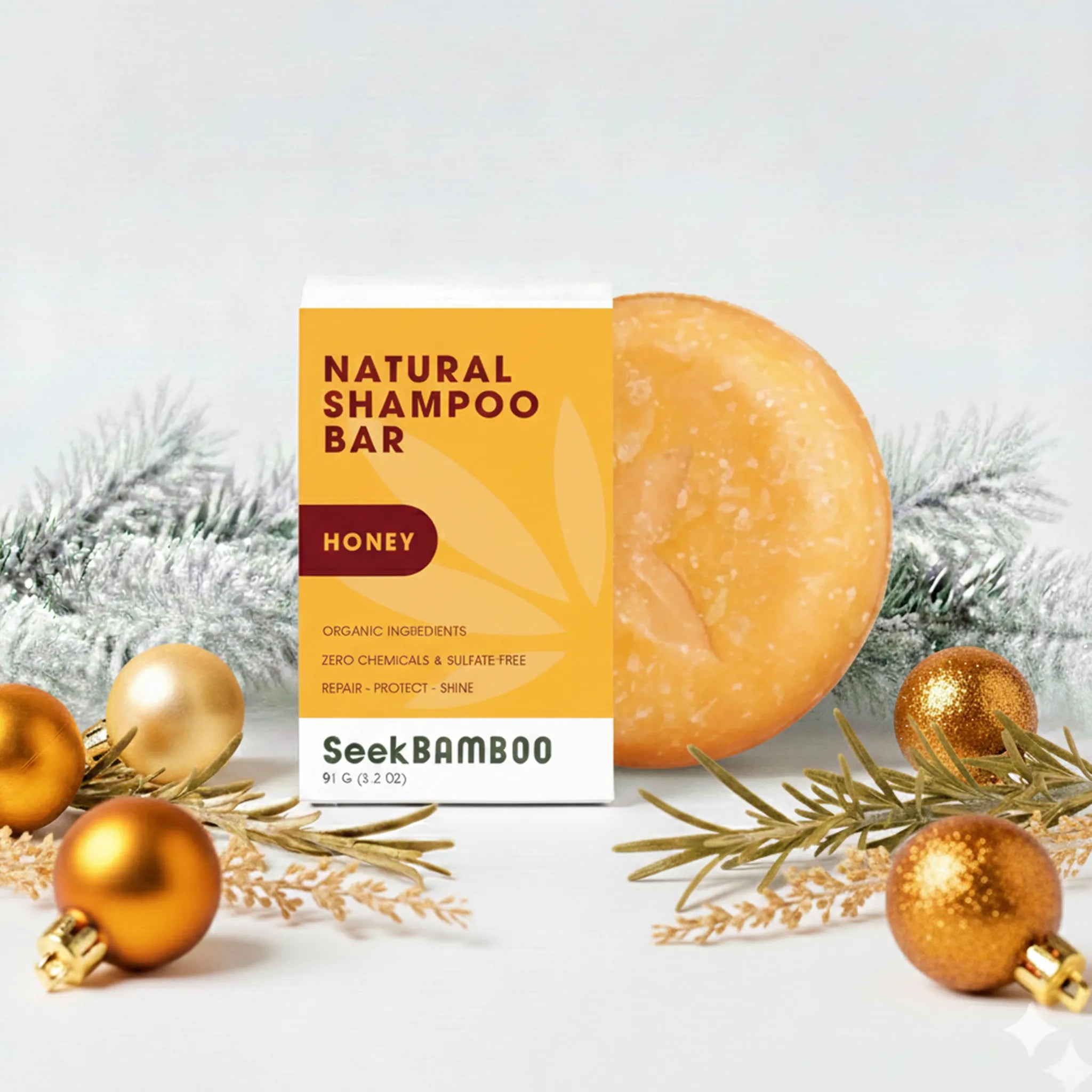
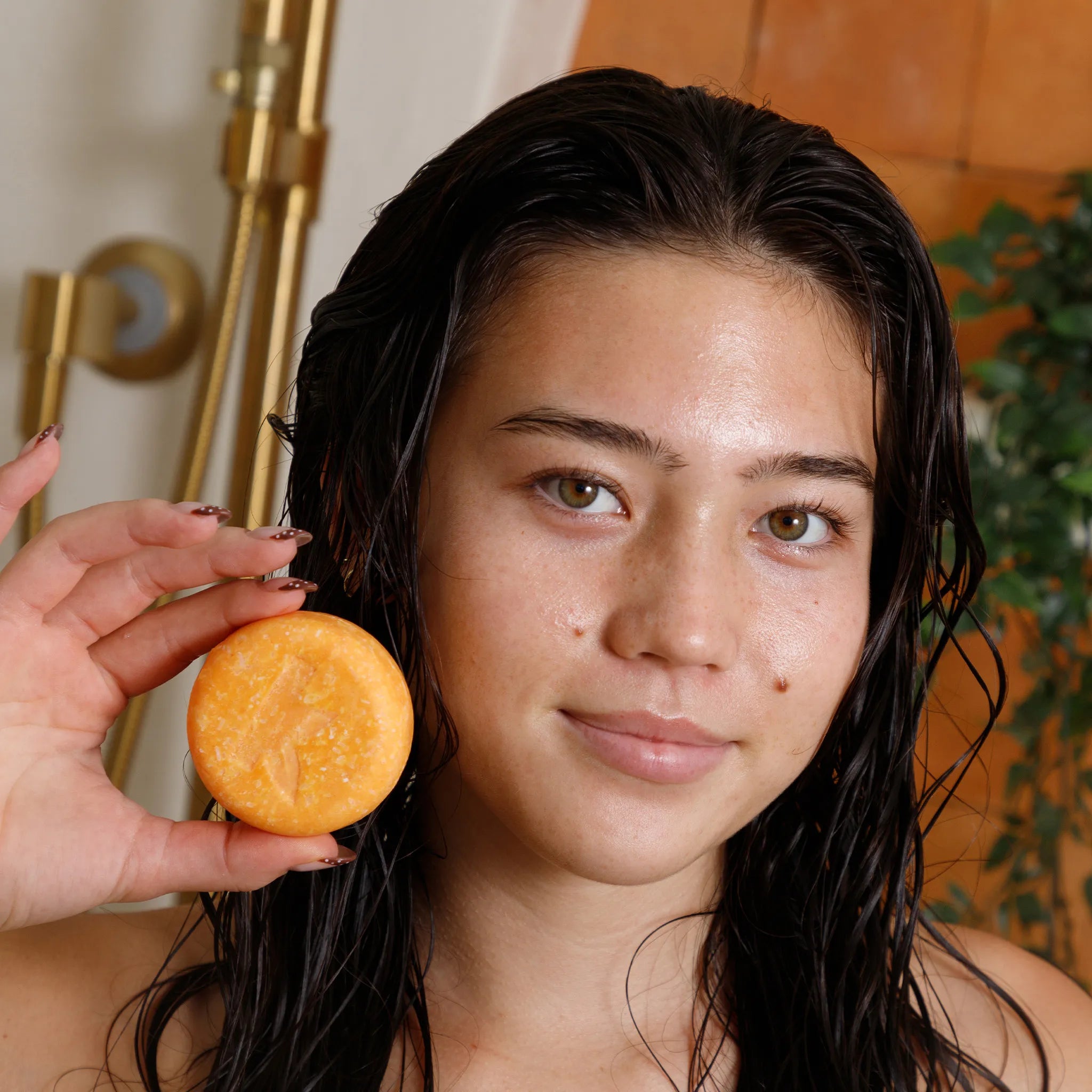
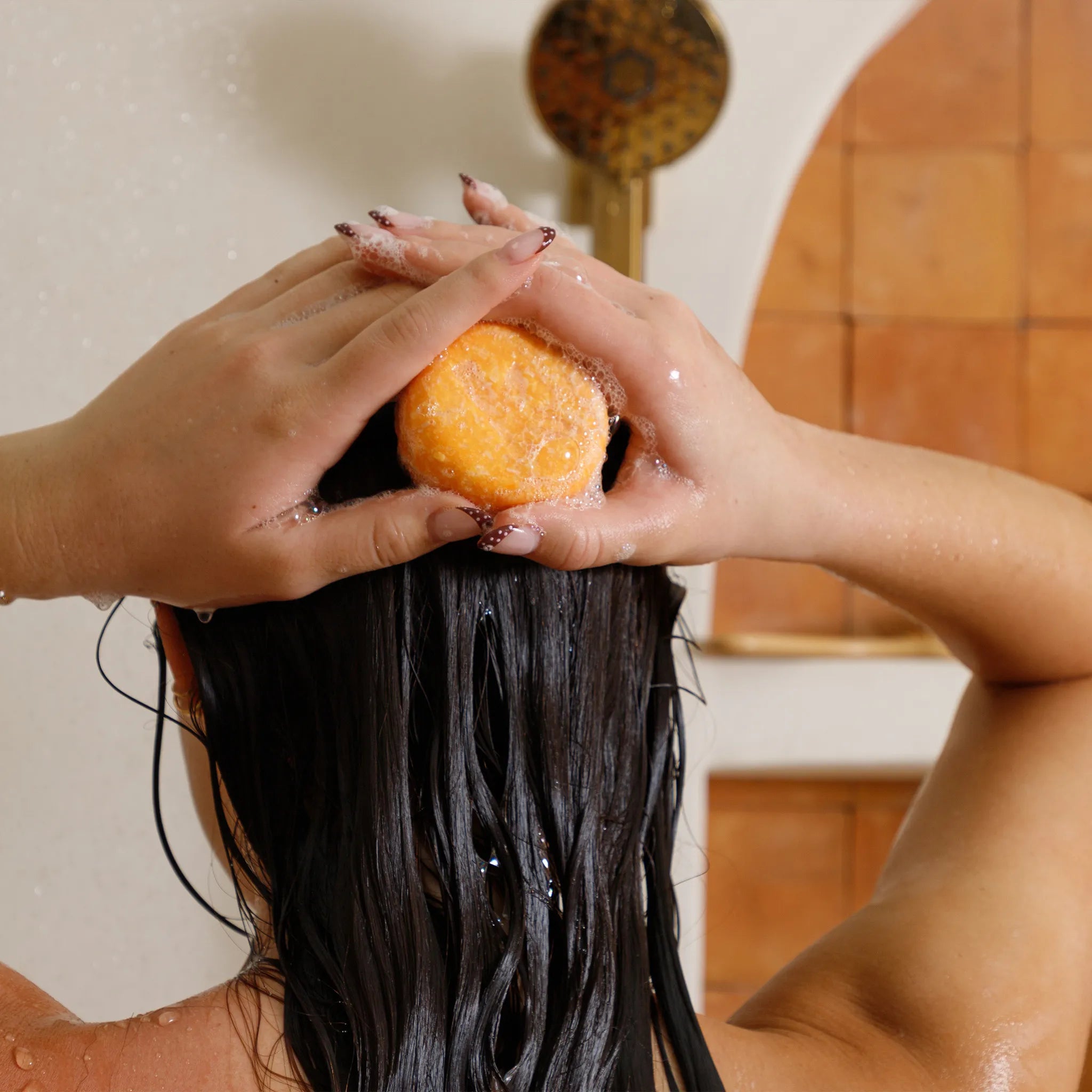
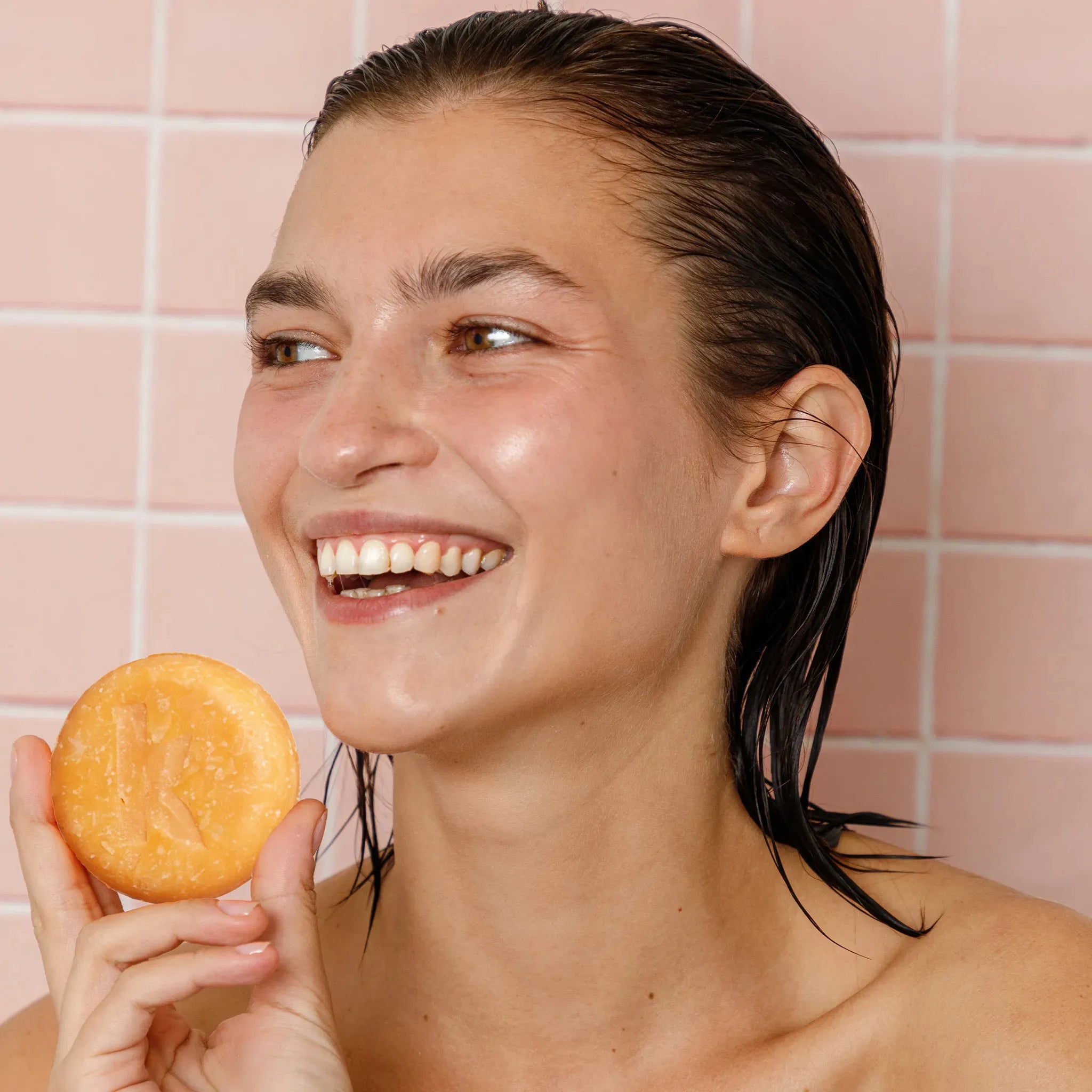
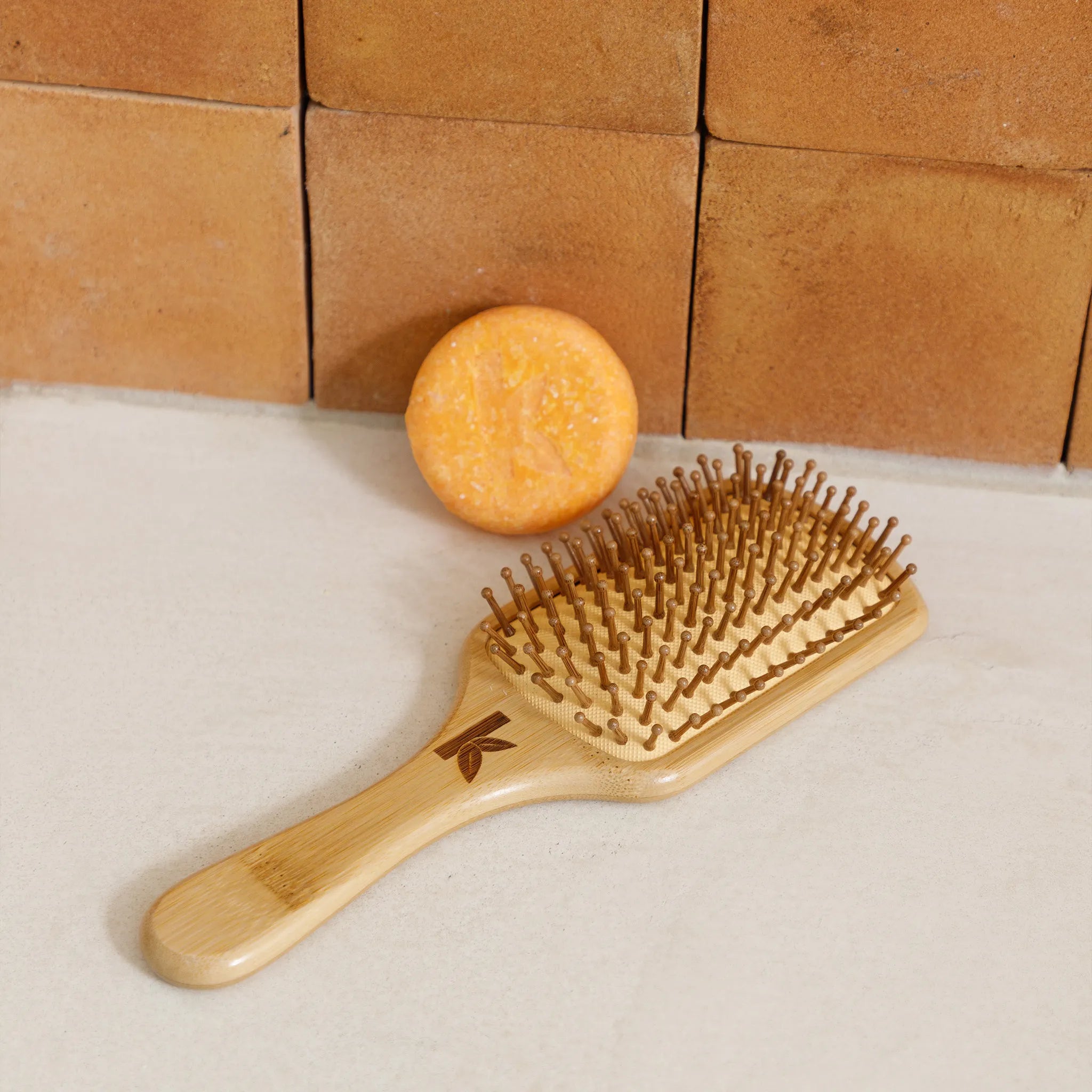
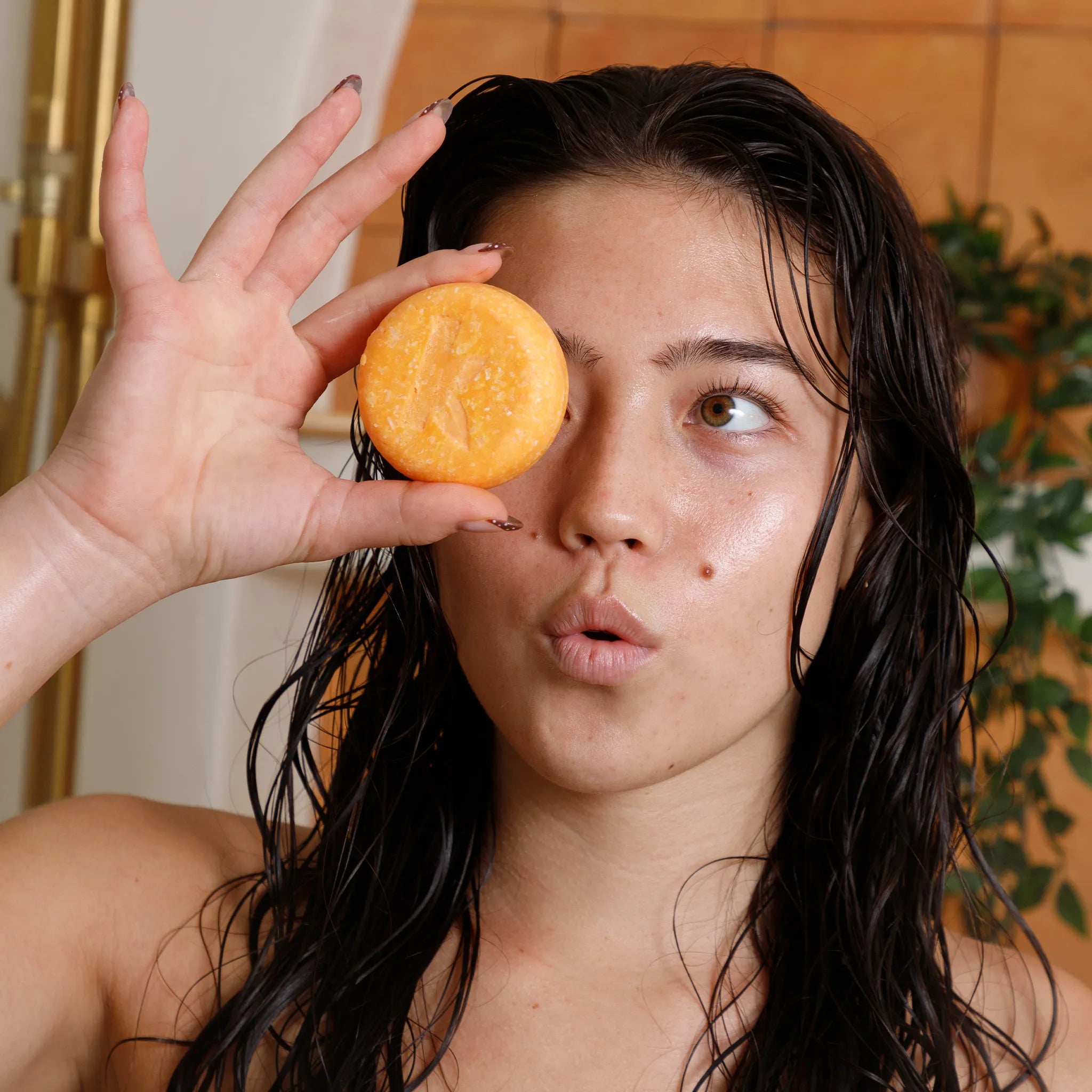
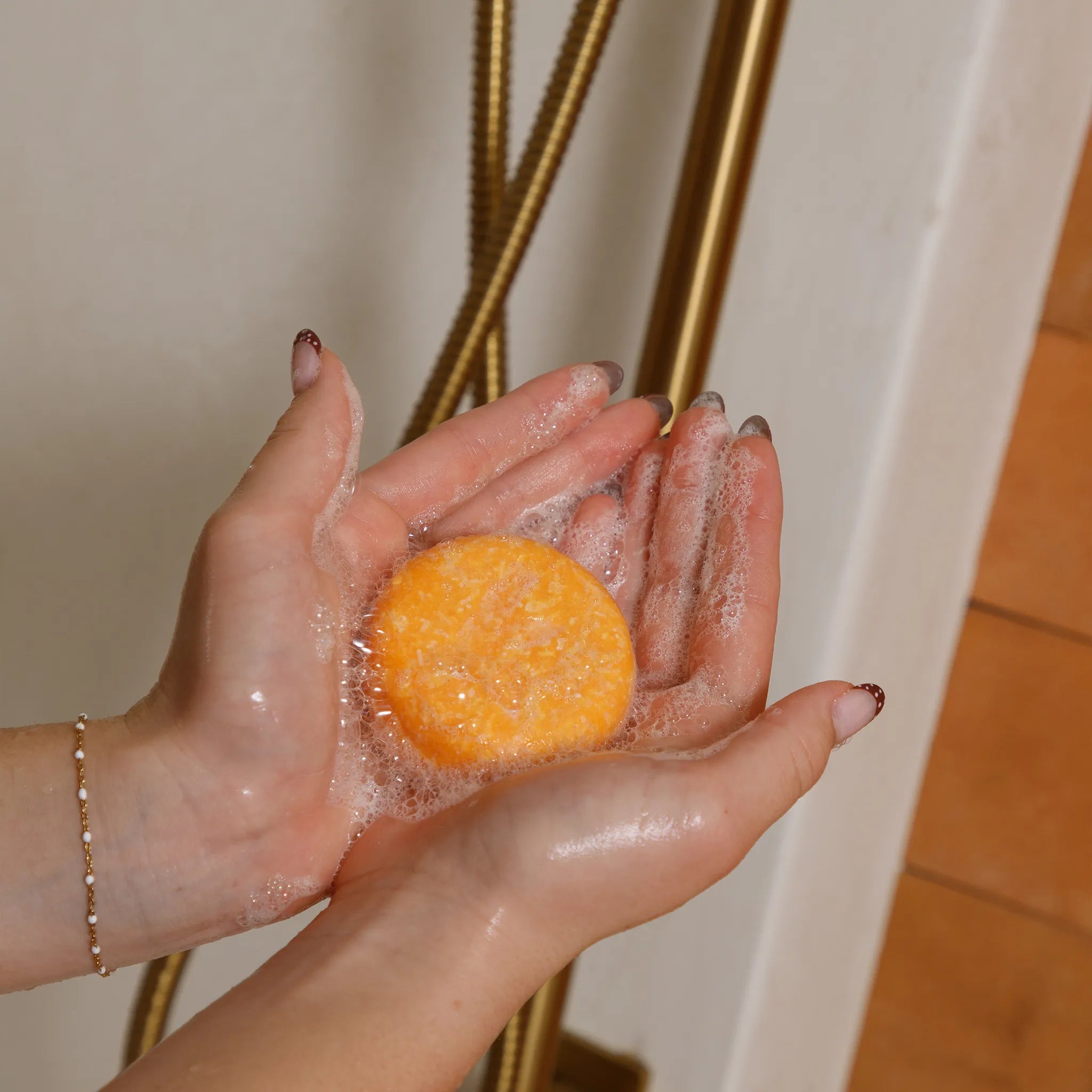
✓ Honey naturally moisturizes the scalp and hair, leaving it soft, shiny, and deeply hydrated
✓ Honey’s antioxidant properties help repair damaged hair and protect it from environmental stressors
✓ Free of sulfates, palm oil, parabens, dyes, & synthetic fragrances
✓ Larger 3.2 oz size lasts 70-90 washes, replacing up to 3 plastic bottles of shampoo
✓ Plastic-free and eco-friendly packaging, making it a sustainable choice for both your hair and the planet
Embrace the Natural Hair Care Revolution
Switching to natural shampoo bars is more than just a trend—it’s a shift toward healthier hair, better for both you and the environment. By choosing products that are free from sulfates, parabens, and silicones, you’re not only protecting your hair from unnecessary dryness and damage, but you’re also taking a step towards sustainability. With carefully selected ingredients designed to nourish and hydrate, natural shampoo bars are the ideal solution for dry hair. Embrace the natural hair care revolution and discover how easy it is to maintain gorgeous, hydrated hair while being kind to the planet.
Natural Soap and Conditioner Bars
Shampoo Bars to the Rescue: Your Dry Hair's New Best Friend
All the answers you’ve been searching for on how natural shampoo bars can rescue your dry hair.
What makes natural shampoo bars ideal for dry hair?
Natural shampoo bars are formulated with nourishing ingredients like plant-based oils (e.g., coconut oil, argan oil) and butters (e.g., shea butter, cocoa butter), which help restore moisture and hydrate dry hair. Unlike conventional shampoos that often contain sulfates and parabens, natural shampoo bars avoid harsh chemicals that can strip your hair’s natural oils. The gentle cleansing action of these bars helps to maintain your hair's moisture balance, leaving it soft and hydrated after every wash.
How do I use a shampoo bar correctly for dry hair?
To get the best results with a shampoo bar, start by wetting your hair thoroughly. Gently rub the shampoo bar between your hands or directly onto your scalp to create a lather. Massage the lather into your scalp with your fingertips, avoiding harsh scrubbing. Focus on cleaning the scalp, as this is where dirt and oil accumulate. Rinse thoroughly with cool or lukewarm water to help seal the hair cuticles. Follow up with a conditioner to lock in moisture. Be sure not to overwash, as this can strip your hair of its natural oils.
How often should I wash my dry hair with a shampoo bar?
Overwashing dry hair can worsen its condition by stripping it of the natural oils it needs for hydration. It's best to wash your hair 2-3 times a week, or as needed, depending on your lifestyle. If your hair feels greasy between washes, try using a dry shampoo or simply rinse with water to refresh your strands. This way, you avoid overdrying your hair while still keeping it clean and healthy.
Can shampoo bars help with scalp dryness and irritation?
Yes! Natural shampoo bars can help soothe a dry, irritated scalp because they are free from harsh chemicals like sulfates and parabens that can exacerbate dryness. Ingredients like aloe vera, tea tree oil, and chamomile are commonly used in natural shampoo bars to calm and hydrate the scalp. Regular use of a gentle, moisturizing shampoo bar can help restore balance to your scalp and reduce discomfort from dryness or itching.
How long will a shampoo bar last on dry hair?
The lifespan of a shampoo bar depends on how often you use it and how much you apply per wash. On average, a shampoo bar can last anywhere from 50 to 75 washes, making it a highly cost-effective alternative to bottled shampoo. Since shampoo bars are concentrated, you only need a small amount to cleanse your hair, which also helps extend the life of the bar. For dry hair, it’s important not to overuse the product, as this could weigh the hair down.
Can I use a conditioner with a shampoo bar for dry hair?
Yes, using a conditioner after shampooing with a shampoo bar is a great idea for dry hair. Conditioner helps seal in moisture, smooth the hair cuticle, and prevent frizz. If you're using a shampoo bar specifically for dry hair, you may also want to consider using a natural conditioner bar that is rich in moisturizing ingredients such as shea butter, coconut oil, or avocado oil. This will enhance the benefits of the shampoo bar and leave your hair feeling soft, hydrated, and manageable.
Can shampoo bars help with hair breakage from dryness?
Yes, natural shampoo bars can help reduce hair breakage caused by dryness. The moisturizing ingredients in the shampoo bars help to nourish and strengthen the hair, preventing further damage. By providing the necessary hydration and avoiding harsh chemicals, these bars can restore your hair’s elasticity, making it less prone to breakage. Pairing your shampoo bar with a good conditioner will provide additional hydration and protection to keep your hair strong and healthy.
Are shampoo bars safe for color-treated dry hair?
Yes, many natural shampoo bars are safe for color-treated hair. Since they don’t contain harsh chemicals like sulfates, they’re much gentler on dyed hair compared to traditional shampoos. However, if your hair is extremely dry or damaged from chemical treatments, it's important to choose a shampoo bar specifically designed for color-treated hair. These bars are often formulated to protect the color while still providing the moisture your hair needs.


